




By Christina Savoiardo Section Editor
From August 27th to September 2nd, I had the amazing opportunity to participate in Glendon’s Orientation Week as an O-Lead. You might be wondering what this has to do with the title… Well, I will explain how this week transformed my mindset and, without exaggeration, changed my life.
For the majority of my life, I was always a little shy. I would tend to gravitate towards small groups of friends; I didn’t always prefer working with others, and speaking up in big groups often felt intimidating. Even as someone so timid, I had the innate desire to become a leader, meet new people, and just help others in general. Since I was eleven, I knew I wanted to become a teacher. I did all I could to gain relevant experience such as volunteering at the library to help kids practice French reading skills, working at summer camp, and joining Peace by PEACE at Glendon. This story begins in August 2023, just after I participated in my O-Week as a first-year student. I met so many new people. As someone with limited experience in making so many connections at once, it was both exhilarating and overwhelming. When my O-Week came to an end, I found myself thinking, “I actually kind of like this; maybe I should do it again?”.
After a few months, January 2024 rolled around. On campus I heard about a club fair going on, so I went to check it out. A table with a poster about Orientation Week and becoming an O-Lead intrigued me. I got more information and

decided to consider this opportunity. Then came May. I was in a class with another student who was the O-Week leader for my team (special shout-out to him!). He was talking about signing up to become an O-Lead, since applications were opening soon and he convinced me I should do it too. That encouragement confirmed it to me, making it certain that I should become an O-Lead. A week later when applications finally opened, I signed up right away, not knowing what to expect. A little over a month later, I had an interview and then received the decision email. I nervously opened it and read the second line, “It is with great pleasure that we would like to offer you the role of being an Orientation Leade
this year.”
In August, I had the chance to meet the other O-Leads in training, recognizing some and meeting others for the first time, flooded with both feelings of nervousness and excitement to see how things would unfold. Initially, I felt shy and unsure of my decision. However, I was also excited to try something new and be a part of the very beginning of a first-year student’s time at Glendon. I got to know everyone better throughout the training week and gradually, I began to feel more and more comfortable, confident and prepared. On the first day, I was beyond nervous, but I made sure to push myself to be confident and make the most of the week. Throughout the week, I
formed bonds with the other O-Leads, as well as got to know the first years through conversations and social activities. Being surrounded by such good energy and being able to set the tone of the first-years’ time at Glendon made me feel so accomplished. I was able to share advice for the school year, encourage joining clubs and generally just talk to them about different things. Hearing them cheer and tell me directly that they were enjoying themselves made my heart feel so full! The whole spirit of O-Week, filled with cheering, dancing, and laughing, as well as helping with/and participating in events and trips, made me feel the most confident and happy I’ve ever felt. I was able to try new things and help the first-year students feel welcome in a new and unfamiliar university environment. Not to mention, cheering and dancing all week made me come out of my shell and let my hidden outgoing personality shine through. Although O-Week is only seven days long, the lessons I learned, the memories I made and the confidence I gained will last a lifetime. I would love to personally thank each and every one of you involved in O-Week 2024 for this incredibly fulfilling opportunity—I can’t express enough how forever grateful I am for everything. Also, if you are reading this and have not yet participated in O-Week as an O-Lead, I strongly encourage you to sign up when applications open! It is a great opportunity and I truly hope it will be as life-changing for you as it was for me.
Editor In Chief/Éditrice En Chef
Flo Lyam Tierra Amie Sosa
Chief of operations/Chef des opérations
Layout Designer/Maquettiste
Roxanna Khosravi
Photographer/Photographe
Dona Nissangaratchie
Section Editor/Rédactrice de sections:
Issues & Ideas/Actualité & opinions Expressions/Expressions Health & Wellness/Santé & bien-être
Leanne Erye
Campus Life/Vie étudiant
& Entertainment/
& Divertissement Metropolis Métropole
Christina Savoiardo
English Editor/Rédactrice Anglaise
Destiny Chan
French Editor/Rédactrice Françcaise
Natalia Tovilla-Bátiz
English Journalist/Journaliste Anglaise
Connell Simkin-Watt
French Journalist/Journaliste Françcaise
Iris Capron
Bilingual Journalist/Journaliste Bilingue
Geneviéve Stacey
Coucou, Glendon !
Welcome to the first issue of Pro Tem for the year! As we kick off another academic season, we’re all about setting ourselves up for success. Ce numéro est rempli de contenus conçus pour vous inspirer et vous donner les moyens de devenir un atout académique et de saisir chaque opportunité d’excellence.
Feeling nostalgic about summer? We’ve got you covered with heartfelt testimonies from Orientation Week to help you reminisce and get excited for the journey ahead. Vous cherchez une pause dans vos études ? Plongez dans nos sections arts et divertissements pour une évasion rafraîchissante, y compris un article captivant sur le sport qui saura vous captiver et vous divertir.
À tous nos étudiants de retour, bienvenue ! Et à ceux qui nous rejoignent pour la première fois à Glendon, nous vous souhaitons un accueil chaleureux et ethousiaste. J’espère que vous vous adaptez bien à l’effervescence de la vie académique et que vous vous préparez pour une année fantastique. A big thank you to the Pro Tem team for their dedication in putting this issue together, and to our contributors for their fantastic articles. Your support means everything, and we’re thrilled to have you along for this journey.

Don’t forget to stay tuned for our next issue! The deadline for submissions is Sunday, September 22. Nous sommes impatients de découvrir vos articles, recettes, critiques et plus encore à l’adresse editor@protemglendon.com.
For the latest updates and exclusive content, follow us on Instagram @protemglendon. It’s the best way to stay connected with Pro Tem outside of our regular issues.
Merci pour votre fidélité. Profitez de ce numéro et passez une excellente semaine !
For now, et à bientôt, Amie Sosa
Contributors/Contributeur
Violette Daveau
Editor In Chief: editor@protemglendon.com
Chied of Operations:
Photographer: photography@protemglendon.com
Layout: design@protemglendon.com
French Editors: frencheditor@protemglendon.com
English Editors: enfeditor@protemglendon.com
Par Violette Daveau
Je participe en tant que guide d’orientation depuis 2022. La semaine d’orientation est ma semaine préférée à Glendon.
Je me souviens de ma première semaine d’orientation en 2019. Je me revois entrer à Glendon pour la première fois et parler à une étudiante en français. Je me revois entendre notre guide qui nous raconte l’histoire de Glendon. Je me revois voir tous les guides avec des jerseys en train de crier des chants remplis de gros mots et de blagues familières. Je me demandais :
C’est ça, l’université ?
Oui, c’est ça l’université ! Mais la semaine d’orientation est très spéciale.
Il y a cette magie qui circule dans tous les esprits de chaque guide. Cette « magie de O-week » ou en anglais « magic of O-week » existe pour faire en sorte que tous les nouveaux arrivants passent le meilleur moment de leur vie (bien sûr, sans boire d’alcool ou prendre des drogues).
J’ai remarqué que la semaine d’orientation est aussi très spéciale pour
les moniteurs. Tous les ans, j’apprends de nouvelles choses sur moi-même. Tous les ans, je rencontre de nouvelles personnes. Tous les ans, je découvre le campus de Keele de mieux en mieux. Par exemple, mon expérience m’a familiarisé avec les dix autres collèges de l’université. Bethune, Calumet, Founders, Lassonde, McLaughlin, New College, Schulich, Stong, Vanier, et Winters ont leurs propres spécialisations universitaires, leurs propres conseils étudiants, et même leurs propres résidences à Keele. En tant qu’étudiant à Glendon, on est tellement éloigné du campus Keele qu’on ne connaît pas les autres collèges de York.
Tous les ans, je rencontre des moniteurs de collèges différents. Quand la fête foraine de Glendon arrive, les moniteurs de Keele ont tous hâte. J’entends leur dire, « Oh ! C’est très beau, Glendon ! » « Oh ! Il faut que j’aille à Glendon plus souvent ! » « Oh ! Je ne pensais pas qu’il y avait tellement de fleurs, tellement d’arbres, tellement d’espaces verts à Glendon ! Je pensai
juste que c’était un bâtiment ! » Je leur dis que je voudrais passer plus de temps à Keele. Cependant, je trouve Keele trop grand, trop bruyant, et trop loin de chez moi. J’ai déjà de la chance de pouvoir faire un cours ou deux à Keele, mais je ne pense pas que j’aurais le temps d’y aller pour d’autres occasions. Mon expérience en tant que moniteur d’orientation m’a aussi permis de participer à Orient The Leader training (OTL) qui est une journée où tous les moniteurs des onze collèges de York se retrouvent pour se préparer pour la semaine d’orientation. OTL est une journée très spéciale remplie de chants, de danses et de joie. Les mascottes de chaque collège font aussi un défilé ! La semaine d’orientation n’est pas seulement dédiée aux premières années, mais aussi à tous ceux qui portent leurs jerseys. Grâce à mon expérience, j’ai pu passer du temps avec de bons amis à moi. J’ai pu aussi rencontrer de nouveaux amis, qui sont devenus des personnes très importantes dans ma vie. Grâce à mon expérience, j’ai pu faire des sorties que je n’ai jamais faites avant. Par exemple, je suis allé à Canada’s Wonderland, à Wasaga Beach, et au Graffiti Alley pour la première
Actualités de l’été : que s’est-il passé en France pendant que nous bronzions
Par Iris Capron Journaliste Français

Ces derniers mois, la France a été au cœur de grands évènements et polémiques. Tout en gérant l’accueil des Jeux olympiques 2024, l’État français a dû faire face à des difficultés politiques, mais également économiques et sociales…
9 juin 2024 : Emanuel Macron, président de la République, annonce la dissolution de l’Assemblée nationale, un choc pour tous les Français. Pour certains, ce décret est la preuve du respect de la démocratie, pour d’autres une véritable alliance avec l’extrême droite, perçue comme favorite à la suite des élections européennes en
France. C’est un véritable coup de poker donnant lieu à la reprise des campagnes politiques, à la formation de coalitions et à des trahisons a u sein des partis. Pour les partisans de la gauche, les centristes et certains républicains de droite, il est nécessaire de faire barrage à l’extrême droite, arrivée en tête au premier tour des élections législatives le 30 juin 2024. Cette volonté de stopper le parti du Rassemblement national paie puisqu’à la surprise générale, le Nouveau Front populaire, coalition de partis de gauche, obtient 182 sièges à la chambre des députés. Néanmoins, cette victoire reste relative : il n’y a
pas de majorité. N’étant plus plébiscité, le gouvernement est fragilisé et démissionne. Pendant deux mois, l’État français se retrouve géré par un gouvernement intérimaire, sans véritable Premier ministre.
Le 5 septembre 2024, Michel Barnier, homme politique de droite, accède à ce poste : un choix très controversé.
Juillet 2024 : Les pénuries d’eau dans les départements et régions d’outre-mer deviennent intenables pour les habitants. Depuis le début des années 2000, ces zones connaissent des sécheresses de plus en plus dévastatrices et leurs infrastructures vétustes ne leur permettent pas d’affronter les difficultés. Face à la crise, les préfets restreignent l’utilisation de l’eau, son accès devient de plus en plus limité au point que certains endroits de l’île de Mayotte se retrouvent sans cette ressource potable.
Cette situation soulève des problèmes plus profonds

fois. Cette année, on est allé en canoë jusqu’aux îles de Toronto ; quelque chose que je n’ai jamais fait auparavant. En devenant guide d’orientation, tu fais plus que de représenter York ou Glendon : tu consacres tout ton temps et ton énergie pour créer des expériences inoubliables. Ce sont des journées longues et fatigantes, mais à la fin de la journée, tu te sens fier parce que tu as aidé les nouveaux étudiants et tu as eu de nouvelles expériences. À la fin de la semaine, tu as mal à la gorge, mais au moins, tu t’es fait de nouveaux amis. Quand la semaine est finie et les cours recommencent, tu te demandes où est allée cette magie. C’est là où tu réalises que la magie reviendra l’année prochaine.
tels que le changement climatique, la croissance démographique ou encore le mauvais entretien des infrastructures. Chez les habitants des DROM, un sentiment d’abandon de la part de la métropole s’exprime également.
26 juillet 2024 : Après des mois d’attente, Paris ouvre enfin ses portes aux athlètes du monde entier lors d’une cérémonie inoubliable — un chef d’œuvre — rassemblant des milliers de personnes. Tout a été réfléchi pour mettre en avant les valeurs de la France telles que celles de sa devise, mais également l’inclusion, la diversité et évidemment le sport. Ce dernier est incarné par les États-Unis, grand vainqueur de cet évènement sportif, et par un nageur français dont le nom est sur toutes les lèvres, Léon Marchand.
Cependant, la beauté de cette cérémonie et du sport n’a pas réussi à faire oublier les choses qu’il a fallu sacrifier pour organiser ces
Jeux olympiques. Le monde a vu les paillettes et le spectacle, mais les Français pensent encore aux milliards d’euros dépensés dans la dépollution de la Seine, aux étudiants délogés de leurs appartements, au « nettoyage social » effectué dans la ville et à l’augmentation de la pollution de l’air due à ces trois semaines.
« Résultats des Élections législatives 2024 en Temps réel. » Le Monde.fr, www.lemonde.fr/resultats-elections.
Audureau, William. « Tout comprendre À La Dissolution de L’Assemblée nationale : Conditions, Précédents, Conséquences… » Le Monde.fr, 14 juin 2024, www.lemonde.fr/les-decodeurs/article/2024/06/09/ qu-est-ce-que-la-dissolution-de-l-assemblee-nationale_6238345_4355770.html.
Mazuir, Valérie. « Michel Barnier, premier ministre : Ce qu’il faut savoir. » Les Échos, 6 Sept. 2024, www. lesechos.fr/politique-societe/gouvernement/michel-barnier-premier-ministre-ce-quil-faut-savoir-2117495. École normale supérieure de Lyon. « Crise de L’eau À Mayotte Une Question démographique Plus Que Climatique — Géoconfluences. » 2002 Géoconfluences ENS De Lyon, geoconfluences.ens-lyon.fr/actualites/ veille/breves/eau-a-mayotte
Hoarau, Lucie. « Chez Les Français, Le “Roi Léon” marchand fait L’unanimité aux JO. » Le Devoir, 1er août 2024, www.ledevoir.com/sports/817447/francais-roileon-marchand-fait-unanimite-jo France 2. « Paris 2024 : Retour sur Les Moments marquants de La Cérémonie D’ouverture. » Franceinfo, 27 July 2024, www. francetvinfo.fr/les-jeux-olympiques/ceremonies-d-ouverture-et-de-cloture/paris-2024-retour-sur-les-momentsmarquants-de-la-ceremonie-d-ouverture_6690399.html. Alvarez, Concepcion. « Les JO 2024 racontés en cinq polémiques », 17 juillet 2024. Novethic, novethic.fr/ economie-et-social/droits-humains/a-j-9-les-jo-2024-racontes-en-cinq-polemiques
Par Geneviéve Stacey Bilingual Journalist
Cher Premier Ford,
Un groupe d’entre nous fait du bénévolat pour diriger un club destiné aux jeunes âgés de 8 à 14 ans intéressés par la collection des roches et des minéraux (voir YTMC.org). Ayant été membre avant de devenir bénévole, je peux attester de façon personnelle du grand bien que ce club apporte aux jeunes passionnés par les roches et les sciences en général. Vous mentionnez souvent votre engagement envers l’éducation STIM. En fait, le Ministère Lecce est même cité dans l’article suivant : « L’objectif ici aujourd’hui est d’envoyer un signal aux conseils scolaires pour qu’ils recentrent leurs énergies sur ce qui compte le plus, c’est-à-dire l’amélioration des compétences en lecture, en écriture et en mathématiques ainsi qu’en éducation des STEM (sciences, technologies, ingénierie et mathématiques]1 ». Le club est franchement l’un des environnements scientifiques les plus informatifs et favorables aux jeunes esprits que je n’ai jamais connus. Le club se réunit au Centre des sciences de l’Ontario, où il utilise l’espace gratuitement. Le groupe réunit là depuis 22 ans, ce qui est littéralement plus longtemps que je suis en vie à ce jour. Il est incroyable de penser à tout le bien que le club a accompli pendant cette période.

Le Centre des sciences de l’Ontario bénéficie d’un excellent emplacement actuel. Il est entouré de spectaculaires exemples du monde naturel. Plus d’une centaine de membres du club s’y réunissent chaque mois pour profiter de conférences, de jeux pédagogiques, de laboratoires et d’échanges de minéraux, ainsi que pour toutes sortes d’échanges d’information. D’après ce que j’ai compris en parlant à d’autres bénévoles, plusieurs anciens membres se sont orientés vers les sciences de la terre et l’industrie minière, sans oublier l’ingénierie et la médecine. Après les réunions, les membres avaient accès aux expositions du centre et pouvaient apprendre à leur guise.
De plus, le bâtiment revêt une importance architecturale historique. Achevé en 1969, le bâtiment met l’accent sur la tactilité et l’interaction. Cela a influencé la conception d’espaces éducatifs inclusifs et démocratiques partout dans le monde2. C’était un des premiers bâtiments de ce genre. Il s’agit de l’un des monuments architecturaux de Toronto et d’un élément important de l’histoire de la ville au milieu du siècle.
Fermer le Centre des sciences, qui constitue un moyen engageant et accessible pour de nombreuses personnes de s’informer sur toutes sortes de phénomènes scientifiques intéressants, semble une étrange façon de promouvoir l’accès à l’éducation STEM. Veuillez reconsidérer la décision de votre gouvernement de fermer le Centre plutôt que d’effectuer les réparations nécessaires à ce magnifique exemple d’architecture. Le Centre des sciences est bien plus que de simples expositions; c’est un lieu d’apprentissage et de rencontre apprécié par des personnes du monde entier. Rien qu’avec le YTMC, des familles venaient d’Oakville, de Newmarket et d’Oshawa, entre autres villes.
Cordialement, G. Stacey
1 Crawley, M., (Avril
By Geneviéve Stacey Bilingual Journalist

To Whom It May Concern,
I am writing to express my concerns regarding a planned project I find rather alarming: Highway 413. I oppose it and would like to share why. You will find several of my arguments to be quite pertinent to the situation at hand.
First, Highway 413 is without a doubt, not the most efficient transportation solution. If the goal is to
<<https://www.cbc.ca/news/canada/toronto/ontario-school-system-education-reform-basics-analysis-1.6813600 >>.
<<https://www.azuremagazine.com/article/architects-rally-to-protect-ray-moriyama-landmark-ontario-science-centre/ >>.
solve issues related to distance or efficiency, public transit would be more cost-effective and practical in the long term. Rapid transit would be ideal, but an investment in public transportation, in general, would still be a step in the right direction. If the aim is to move more freight, there’s a solution for that, too; truck toll discounts on Highway 407 would address the needs Highway 413 is supposed to, without having to build another highway.
Furthermore, the estimated cost of the highway is somewhere between $6 billion and $10 billion. That amount of money could benefit a large number of people. You could address other far more pressing human rights issues. While improving public transit would be a good option, you could also invest in more affordable housing, environmental initiatives, poverty reduction programs, or the school system (though the current government has an emphasis on STEM, a lot of schools still rely on outdated
technology; perhaps providing new technology for schools would be a wise long-term investment). There are many provincial needs far more pressing than a new highway, and reallocating the funds could provide long-term solutions. With the rising costs of living, 10 billion dollars could help a lot of people improve their quality of life for the better.
Additionally, there is the proven theory of “induced demand”. New urban highways, unless tolled, rapidly fill up again due to this phenomenon. If the goal is genuinely to shorten people’s commute time, induced demand would counter any positive impact within five years of the highway’s construction. Spending 10 billion dollars on a solution that won’t reduce the issue, let alone solve it, is difficult to justify.
Finally, Highway 413 will have a significant impact on farmland, forests, wetlands and conservation areas… essentially, threatening numerous ecosystems vital to human survival. It will
put several species at massive risk, to the point of possibly rendering them extinct. Quite a few municipalities affected by this project are also opposed to it. The highway will promote urban sprawl, serve private sector interests, as well as consume valuable farmland. Sprawl is neither the most efficient nor the most affordable housing solution.
Please stop the project. If not for future generations, then for current ones. With globalwarming intensifying, we don’t need to be further threatening endangered ecosystems for the sake of saving 30 seconds of travel time. Regardless of the outcome - and I suspect it would be a negative one - we will all have to deal with the consequences. My generations, and future ones, need to inherit a world we can actually survive in.
Sincerely,
G. Stacey
Par Leanne Erye Rédactrice de sections
Les matins sans réveil, les journées ensoleillées, les couchers de soleil sur la plage, les barbecues improvisés avec des amis, et la liberté absolue de suivre nos passions… L’été nous offre un refuge où on se laisse porter par nos envies, sans contraintes, ni horaires fixes, ni obligations académiques. Mais une fois que les feuilles commencent à tomber et que les premiers jours de septembre approchent, la rentrée et les réalités universitaires arrivent à grands pas. Les réveils sonnent de nouveau, les cours reprennent, les devoirs s’accumulent, les bibliothèques autrefois désertes se remplissent. Comment réussir à passer du bonheur estival à la rigueur universitaire sans perdre pied ? Face à ces changements et à l’inconnu, il est souvent difficile de garder le
moral. Ressentir un mélange d’appréhension et d’excitation en anticipant le retour aux études est tout à fait normal. Considérez cette période non pas comme une obligation, mais comme une opportunité d’exploration. La rentrée est une opportunité unique pour grandir, se découvrir et s’ouvrir à de nouvelles perspectives. Certes, elle sera parfois exigeante et stressante, mais aussi enrichissante.
Une façon de garder une attitude positive pour faciliter la transition est de se préparer. Après quatre mois, loin des livres, revoir ses anciennes notes de cours en fait partie. Rafraîchir vos connaissances peut renforcer votre confiance à affronter vos nouveaux cours. Cette révision peut également raviver votre passion pour les matières que vous étudiez. De la même manière, réorganiser votre espace de travail peut vous offrir une nouvelle motivation et une sensation de contrôle. Un bureau
encombré peut créer une impression de chaos. En revanche, un espace de travail bien aménagé, décoré avec des touches personnelles comme des photos d’été, peut rendre vos sessions d’étude plus agréables.
Enfin, planifier votre emploi du temps dès le début est crucial. Établissez une routine hebdomadaire typique et ajoutez les dates importantes et les échéances de vos cours à votre calendrier dès que vous les recevez. J’aime utiliser le blocage du temps sur Google Calendar. Cela me permet de visualiser les horaires de mes cours et de mon travail, ainsi que de prévoir du temps pour mes loisirs et pour mes activités parascolaires. Plutôt que de vous noyer dans une liste interminable de tâches, essayez de planifier des périodes pour accomplir vos tâches, en alternant celles qui sont difficiles et celles qui sont plus légères. Une planification bien pensée peut réduire le stress et rendre vos journées plus agréables et plus
équilibrées. Cependant, il est essentiel de rester flexible, d’être à l’écoute de son corps et de s’adapter aux situations inattendues qui se présentent. Se forcer à étudier lorsqu’on est fatigué ou distrait peut être contre-productif. Vous avez maintenant les outils pour réussir, il vous suffit alors de les utiliser pour faire de cette rentrée un moment de croissance personnelle. En abordant la rentrée avec un état d’esprit positif, une préparation réfléchie et une bonne organisation, retrouver le rythme universitaire peut se faire en douceur.

By Christina Savoiardo Section Editor

2. Stay Active
Summer is wrapping up which means the new academic year is about to begin. Being busy with assignments and clubs, as well as other personal commitments may have an impact on keeping your health in check. Whether it is physical or mental, it is important to stay on top of your health habits to ensure your body gets the care it needs to get through the next few months. As someone who’s tried a lot of them, here are some of my tips to keep up your wellbeing this school year.
1. Close Your Laptop and Get Some Rest
As we all know, the workload in university can get heavy and our schedules may get busy! We might have the completely understandable urge to stay up late to complete work. However, doing this too frequently can negatively impact your day-to-day performance; you might be unable to concentrate, your mood might be down, and you’ll become sleep deprived. Even though it might be tempting to stay up late to get work done, it’s important to get your sleep! According to a 2023 study at Carnegie Mellon University, students who get less than six hours of sleep experienced a decline in academic performance1. Getting a good night’s rest will help your body re-energize for the upcoming day and increase your academic performance.
Being busy with school might mean, you’ll be doing assignments for most of the day, but don’t let that stop you from moving around. For those who live in residence, it might seem tempting to go back to your room after class and take a nap. Doing this often results in developing bad habits and feeling demotivated. It’s important to try your best to move around as much as you can to stay in shape. The Glendon Athletic Club includes plenty of services for students with a membership to have fun while staying active, including aquatic programs, personal trainers who are available to help with personalized workouts, a gymnasium, workout rooms, and much more. In general, it is important to keep your body active so that you stay healthy and burn off energy from exercising.
3. Watch Your Eating Habits
For many students who have a meal plan, there might not always be the best/healthiest options, and sometimes eating out is the “better” option. It’s important to remember that you need to feed yourself and ensure your body gets the right amount of nutrients and vitamins. When buying food, or even making yourself a lunch, remember to choose foods that will help you feel your best. Eat your fruits and vegetables, drink water, avoid too much caffeine, have a good balance of protein and vitamins, and watch your sugar. Not to mention, try not to skip meals, especially breakfast. As cliché as it sounds, breakfast is the most important meal of the day, and it helps you start the day off the right foot. Studies show that students perform better academically after a good breakfast, so even if you are short on time, even a fruit or granola bar is helpful.2
4. If You’re Sick, You’re Sick
It’s completely normal to get sick at some point during the school year, but it’s important to listen to your body and take care of yourself. You will most likely feel extremely drained and won’t want to do anything. Get as much rest as you possibly can. Extra sleep is known to help your immune system work better and possibly shorten the duration of the sickness. In addition, drink more water or tea to keep your respiratory system hydrated and thin out mucus3. Take vitamins and medication if needed to help relieve symptoms, as well as lozenges if you’re dealing with a sore throat or cough. Generally, when you don’t feel your best, try as much as possible to not exert yourself so that your body can heal itself and you can feel re-energized as soon as possible.
5. Put Yourself First
University can become stressful, and it can be mentally draining, but it’s important to know before it gets to the point you’re feeling completely burned out. From personal experience, this feeling is incredibly hard to deal with, but here are some tips to help things feel more manageable: Try to create a routine that works for you and your work habits, set boundaries, practice mindfulness (such as meditation and journalling), listen to music, practice hobbies, spend time with loved ones, take breaks when needed, and don’t be afraid to talk to anyone or ask for help if you need it! Even though school is important, your needs and wellbeing come first. You deserve to feel good throughout the school year, no matter the circumstances.4
1 Kish, Stacy. Nightly Sleep Is Key to Student Success - News - Carnegie Mellon University. 17 Feb. 2023, https://www.cmu.edu/news/stories/archives/2023/february/nightly-sleep-is-key-to-student-success
2 CollegeData. 9 Tips for Eating Healthy in College. https://www.collegedata.com/resources/campus-life/tips-for-eating-healthy-in-college
3 DiBiase, Darcy. How to Feel Better: Tips for Self-Care When Sick | What’s Up at Upstate | SUNY Upstate, 15 May 2020. https://www.upstate.edu/whatsup/2020/0515-how-to-feel-better-tips-for-self-care-when-sick.php
4 Richardson, McKayla. 8 Simple Self-Care Tips for College Students | HeyBU Blog | Boston University, 20 July 2023. https://www.bu.edu/articles/2023/8-simple-self-care-tips-for-college-students/.
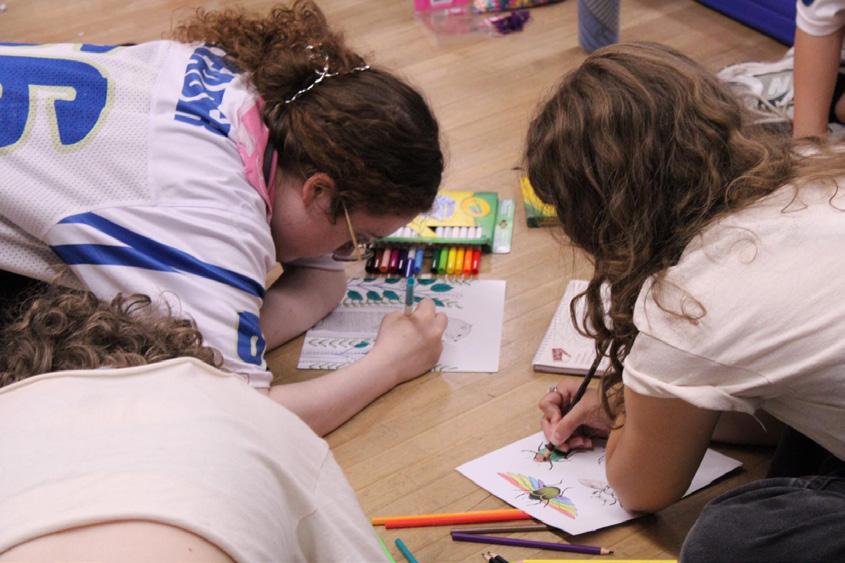
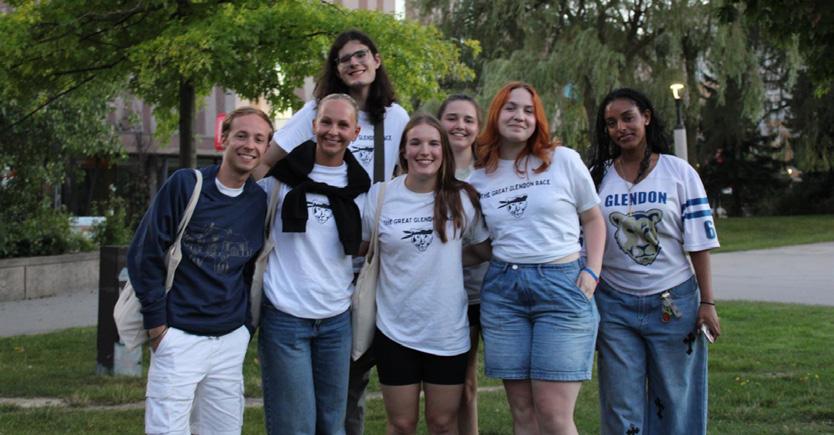
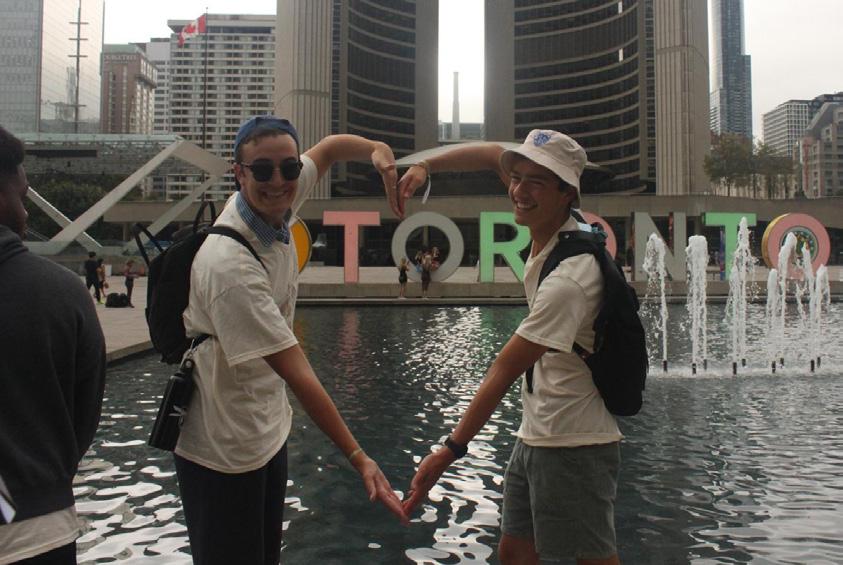
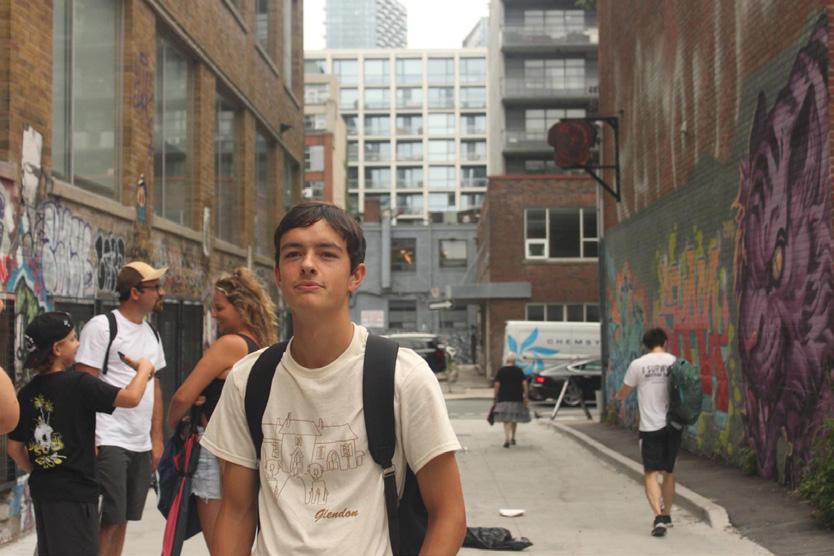

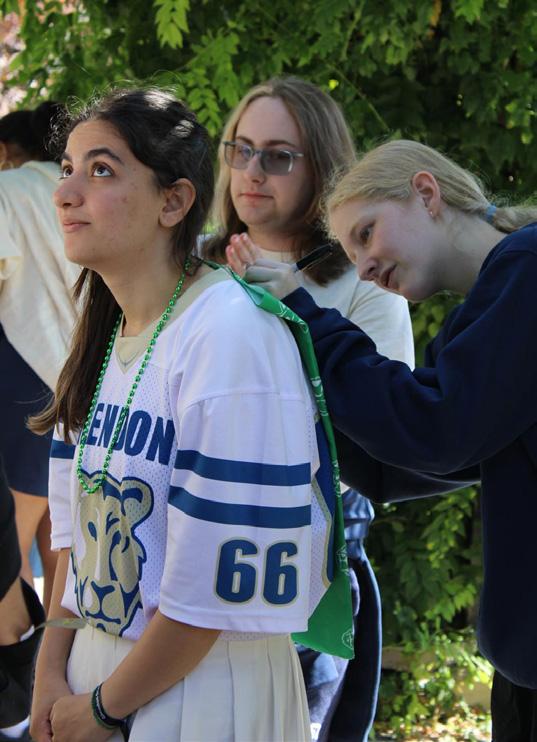
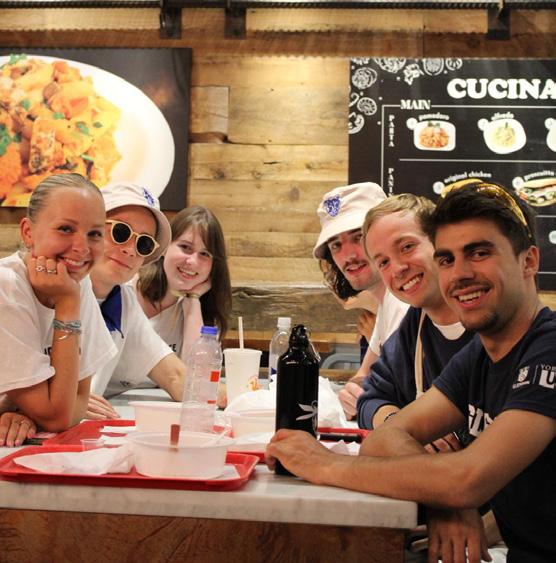
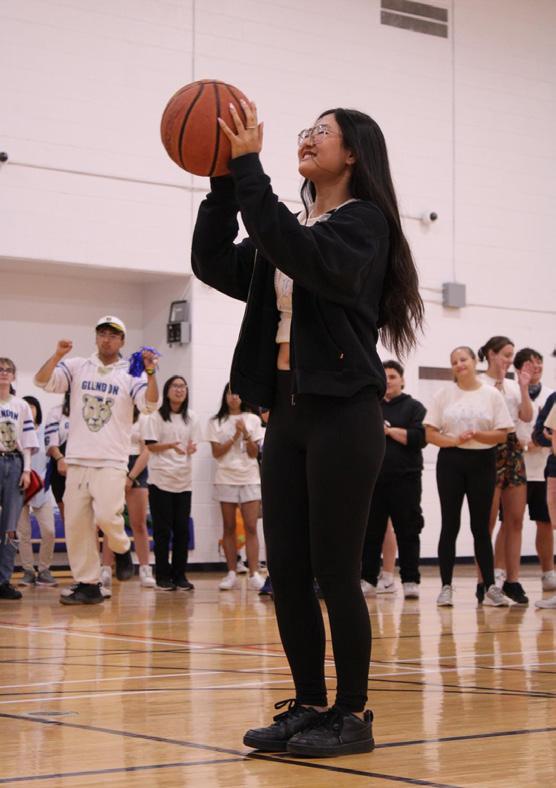
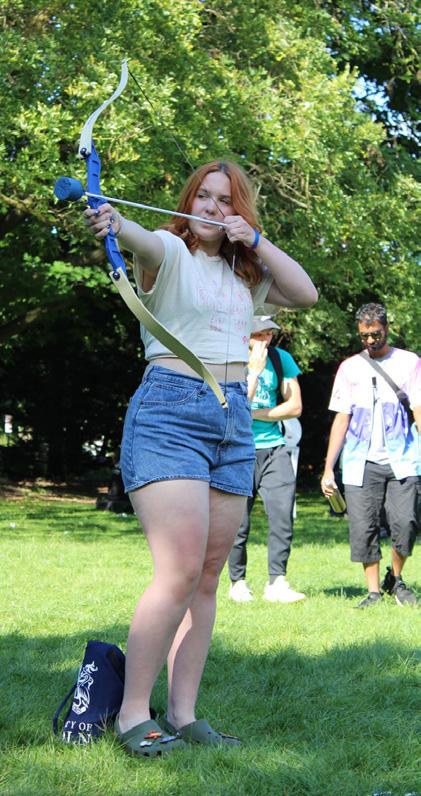
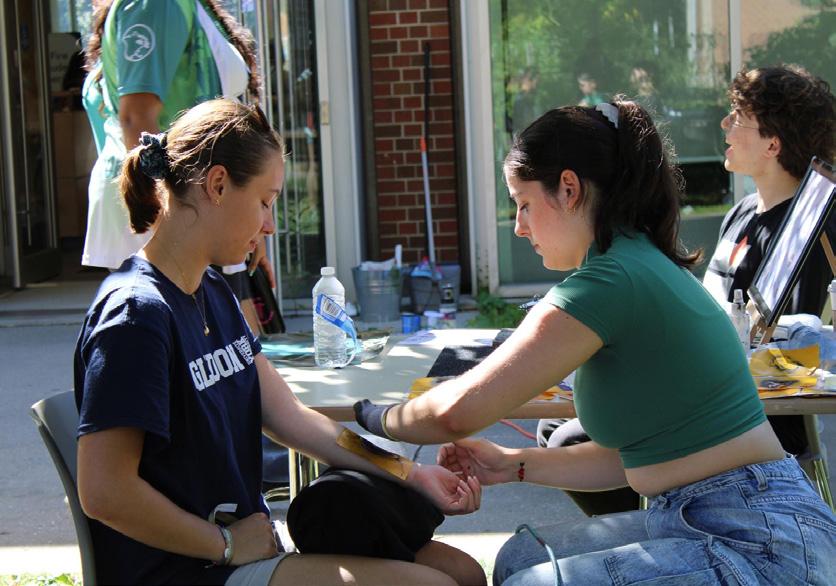
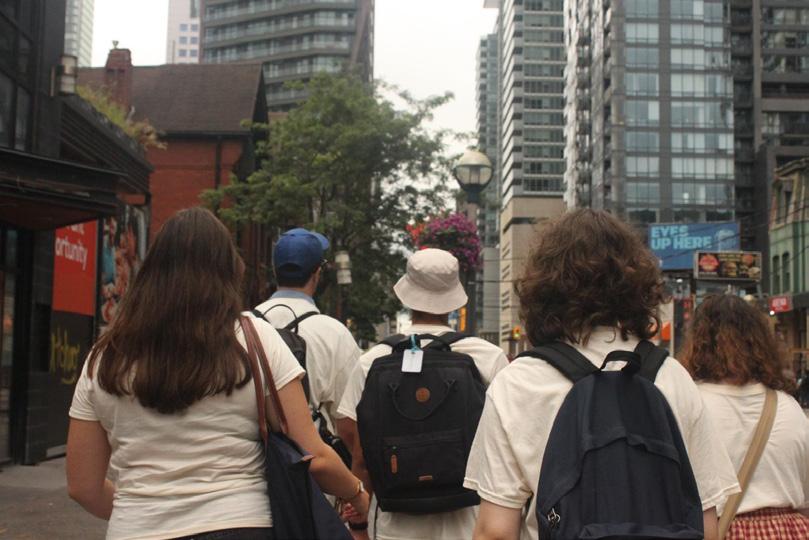

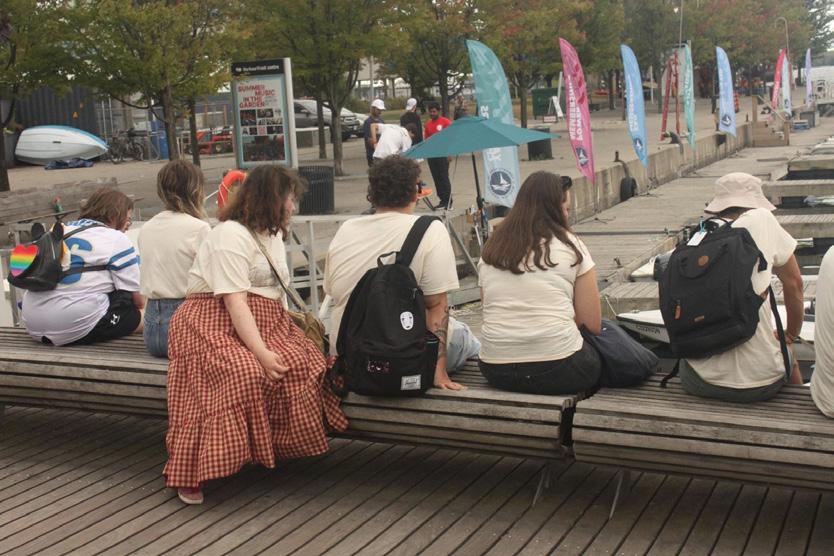
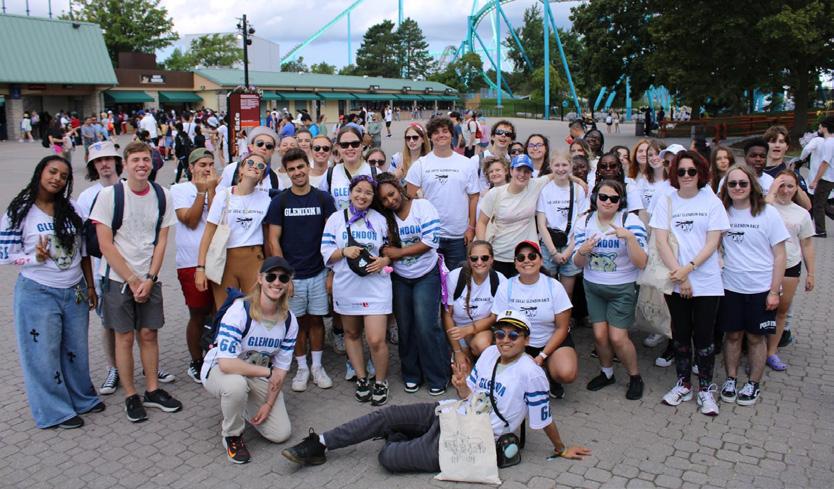
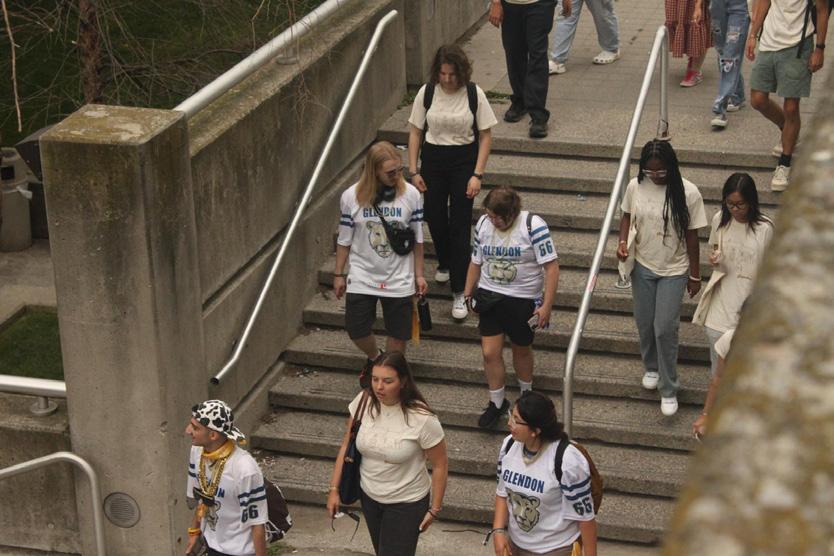
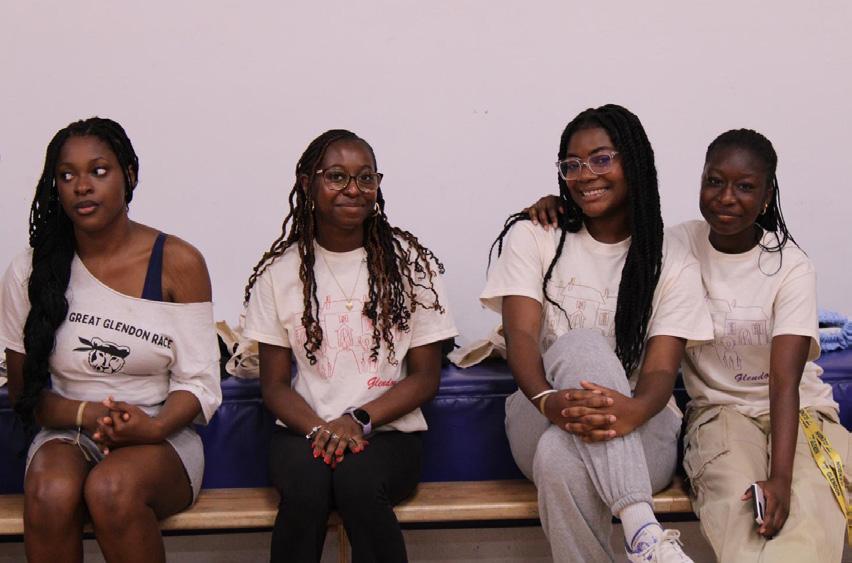
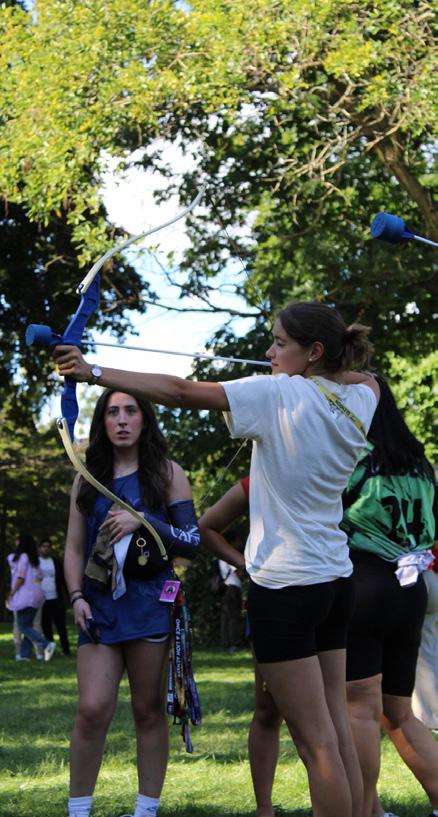
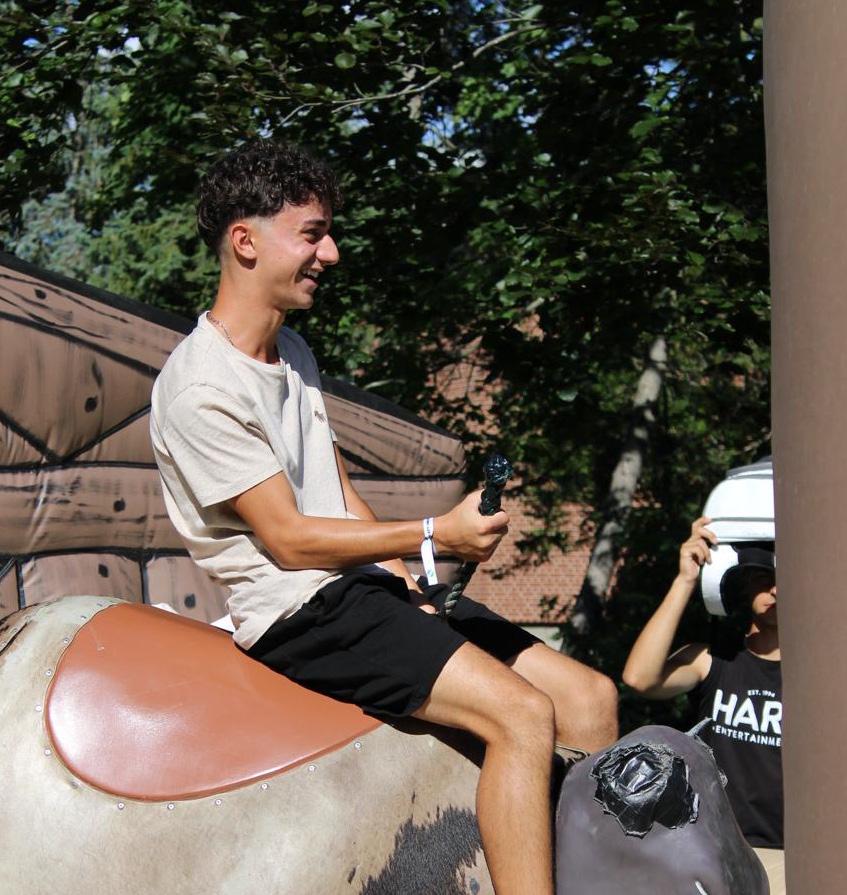
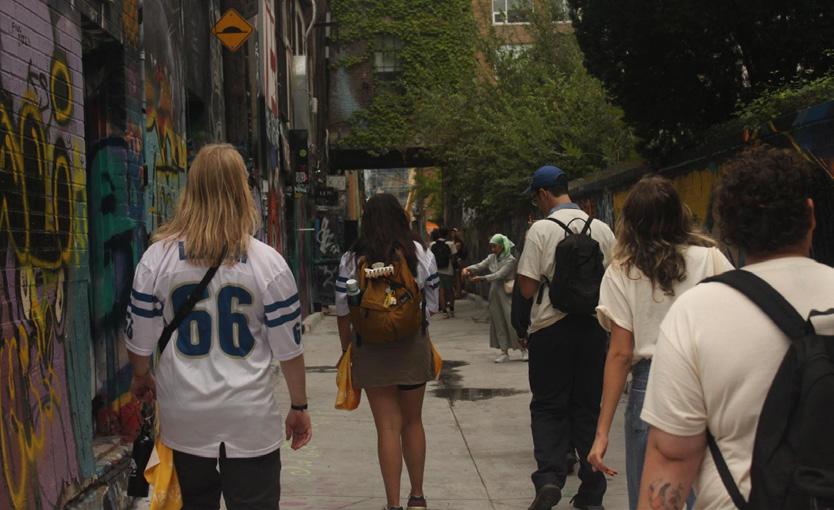
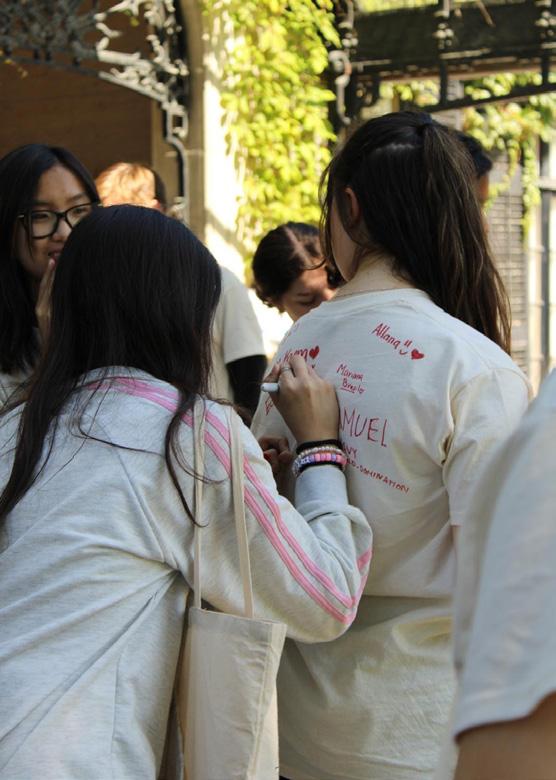
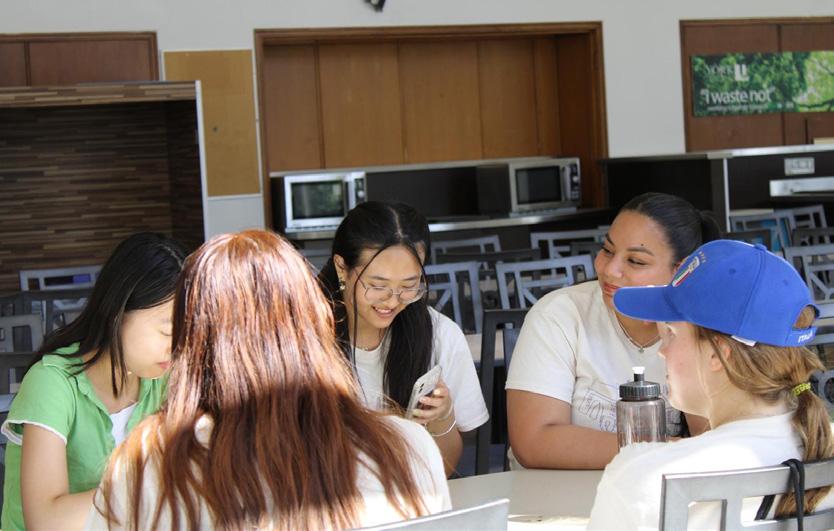
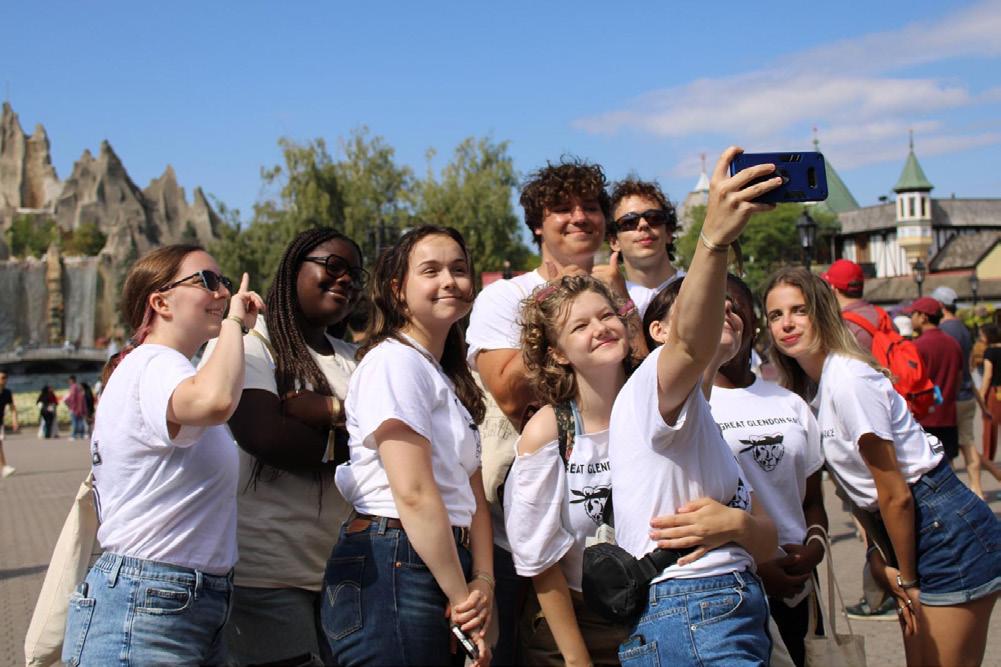

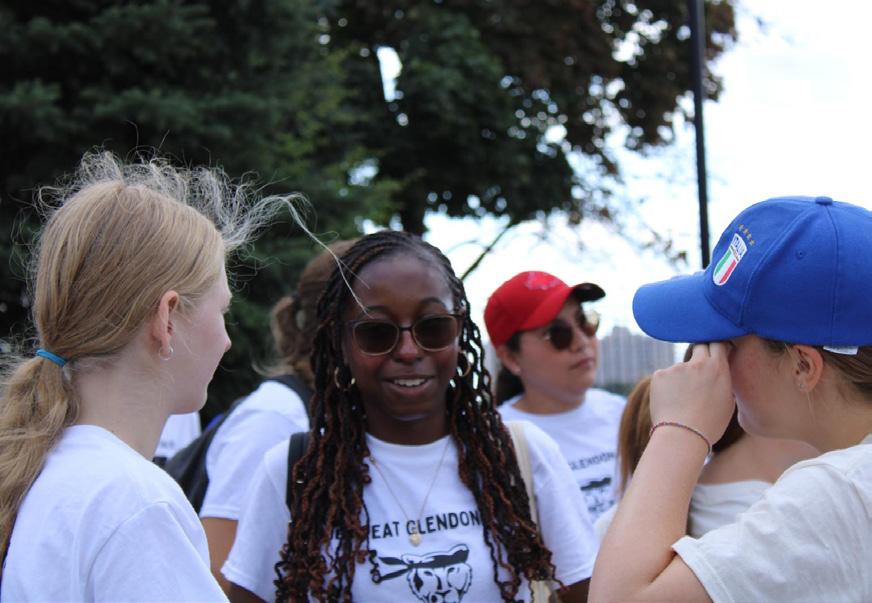
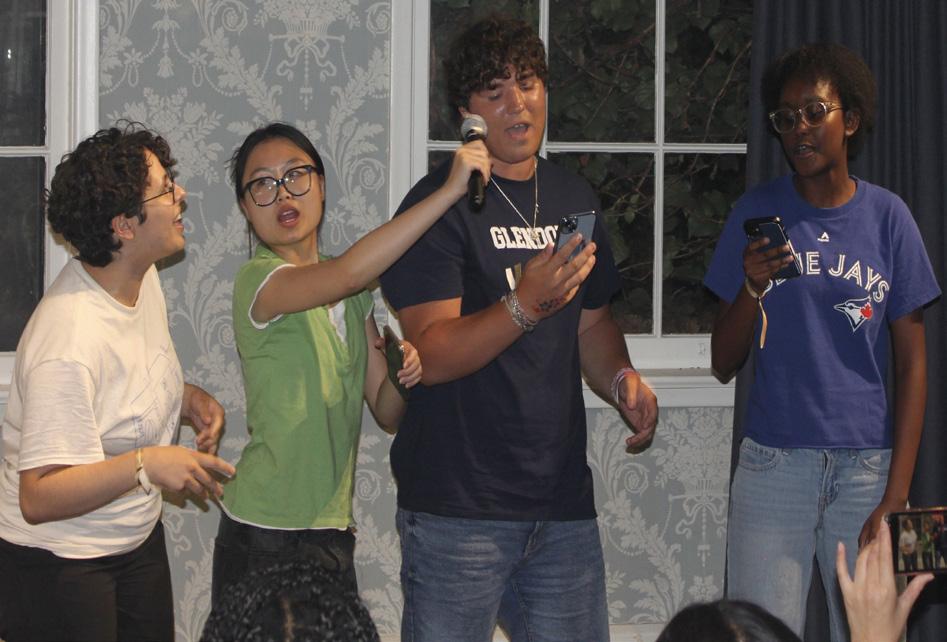
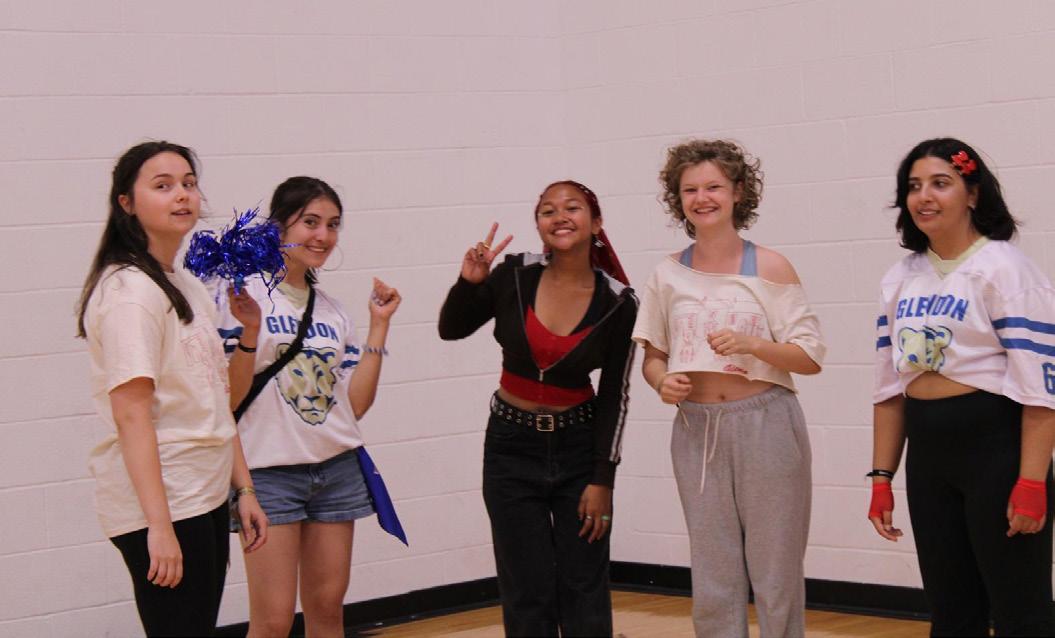
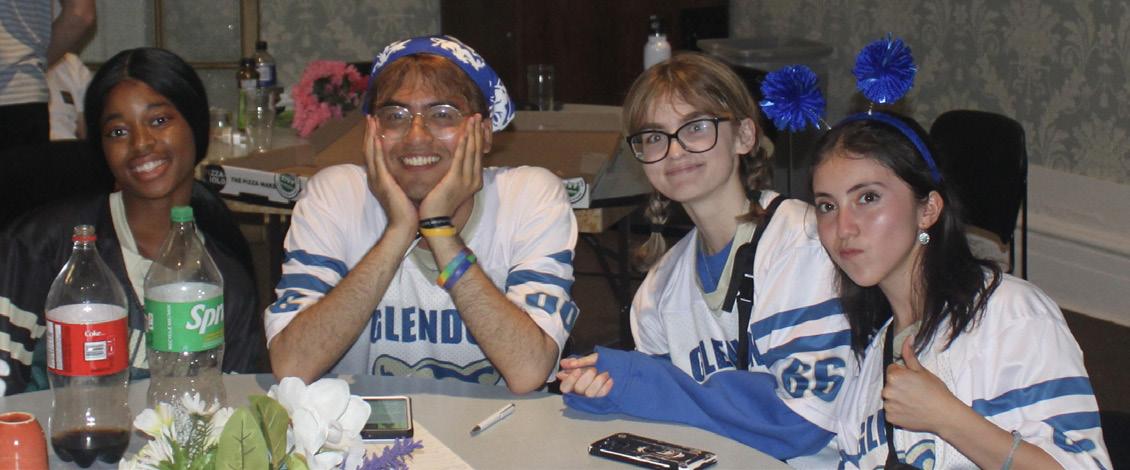
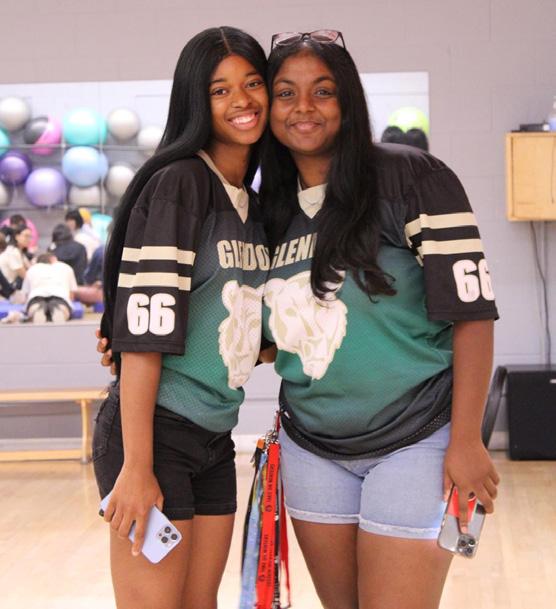
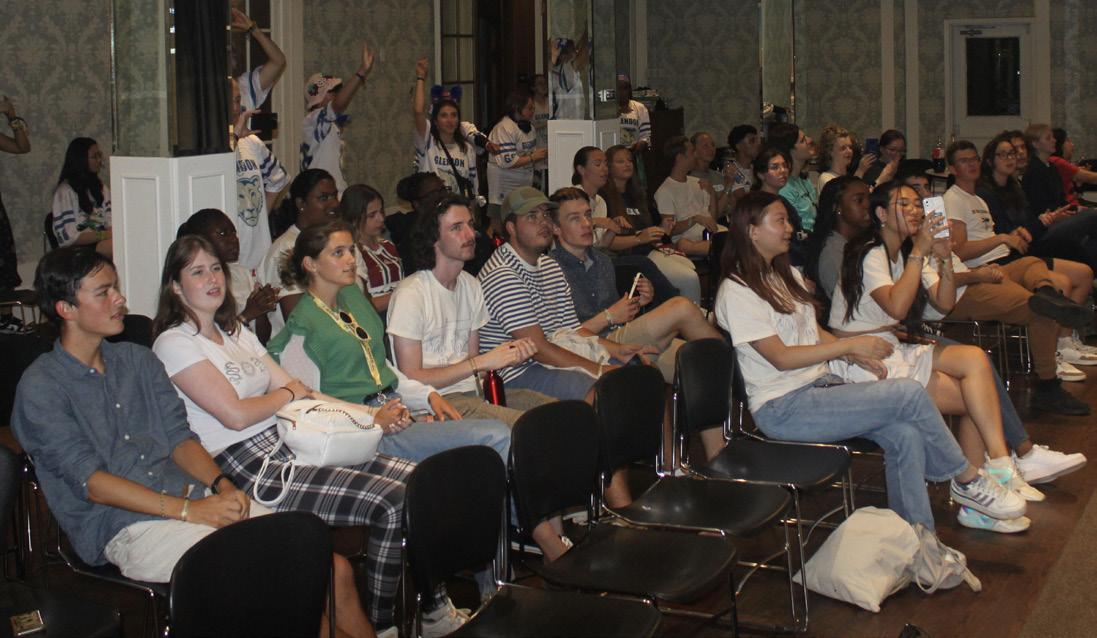
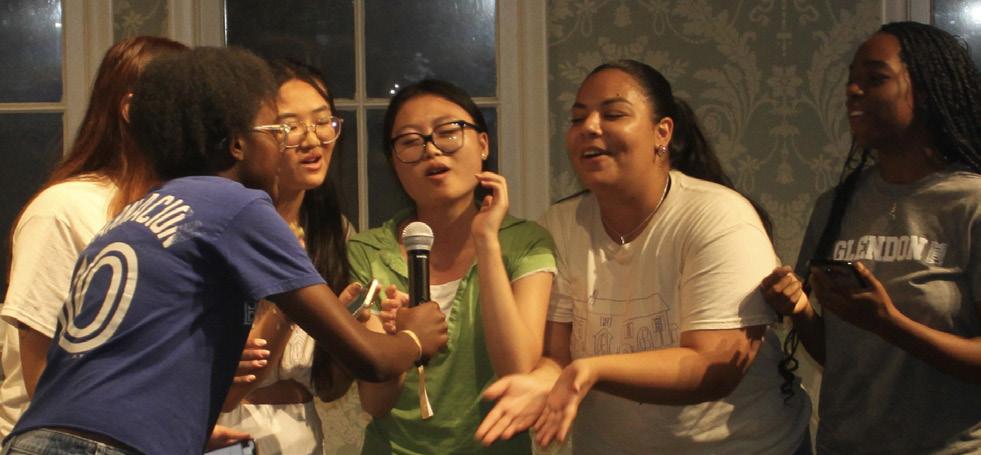

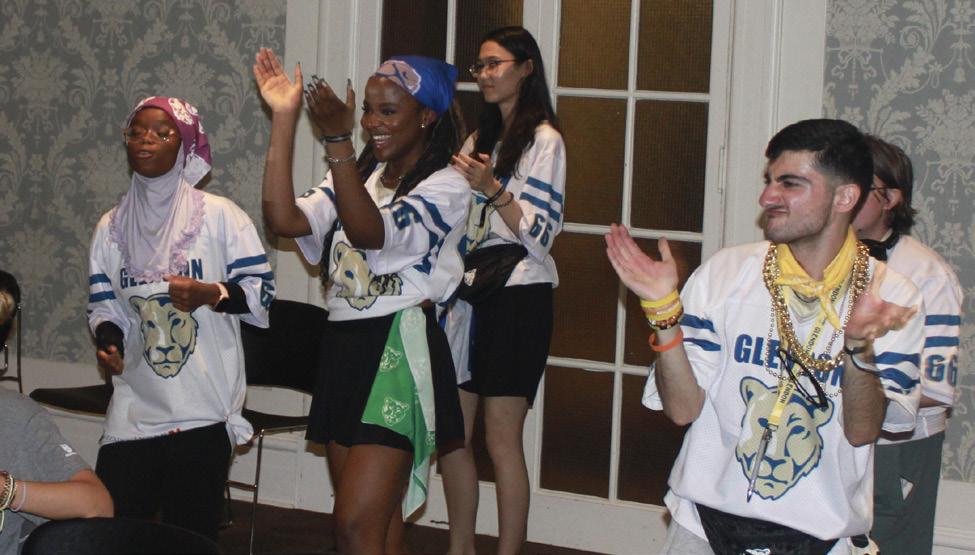
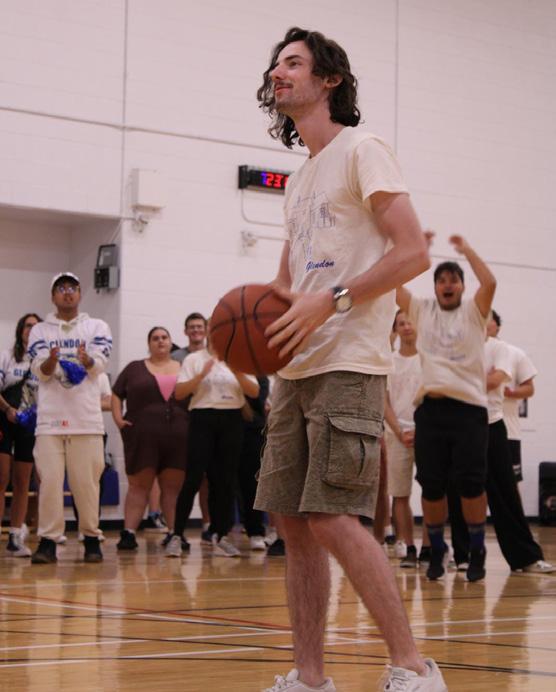
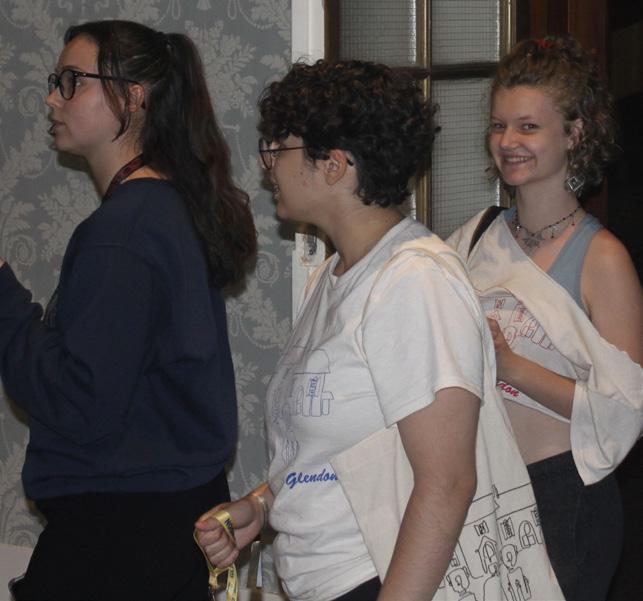

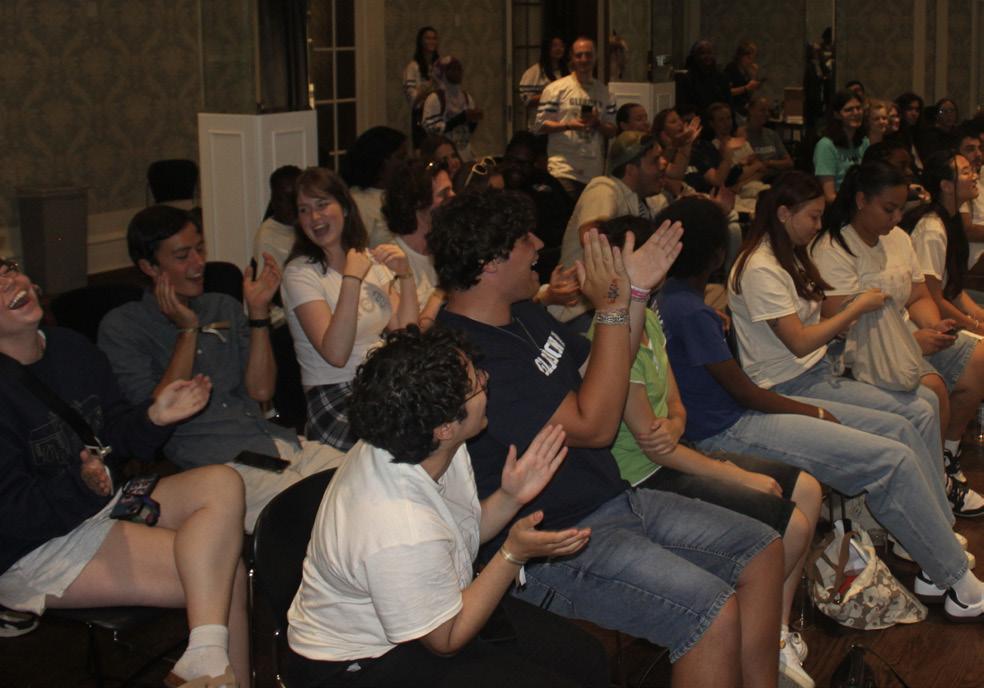
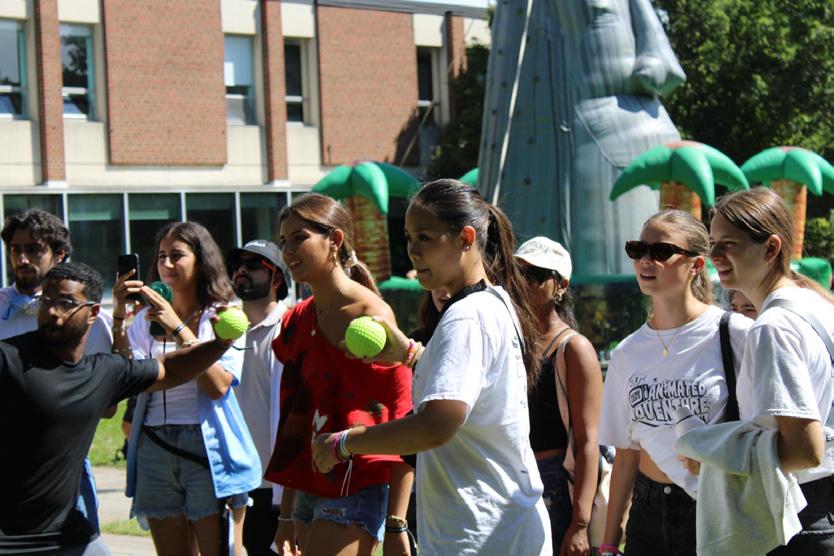
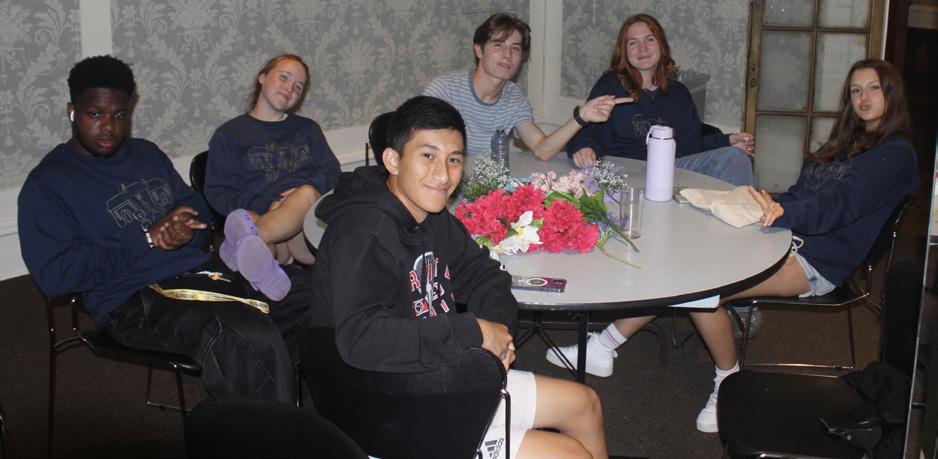

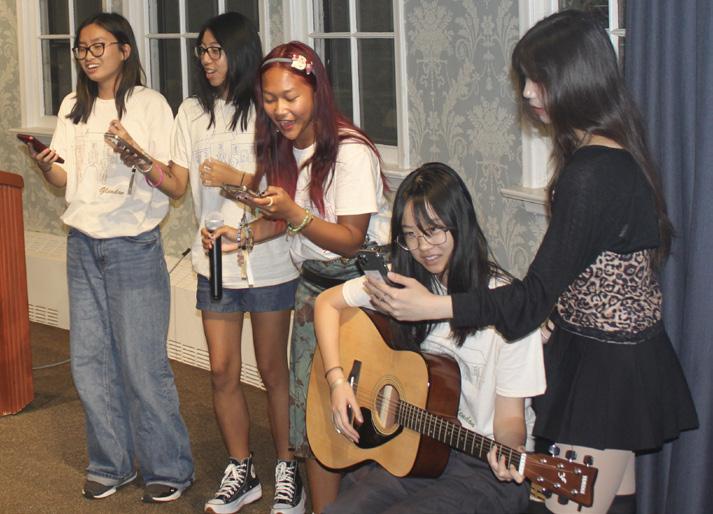
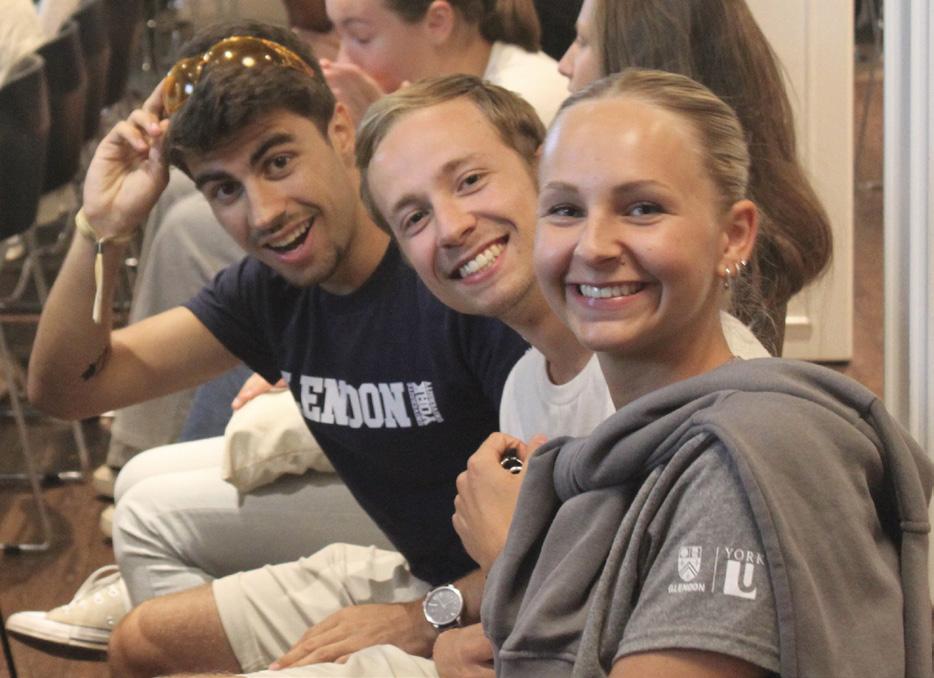
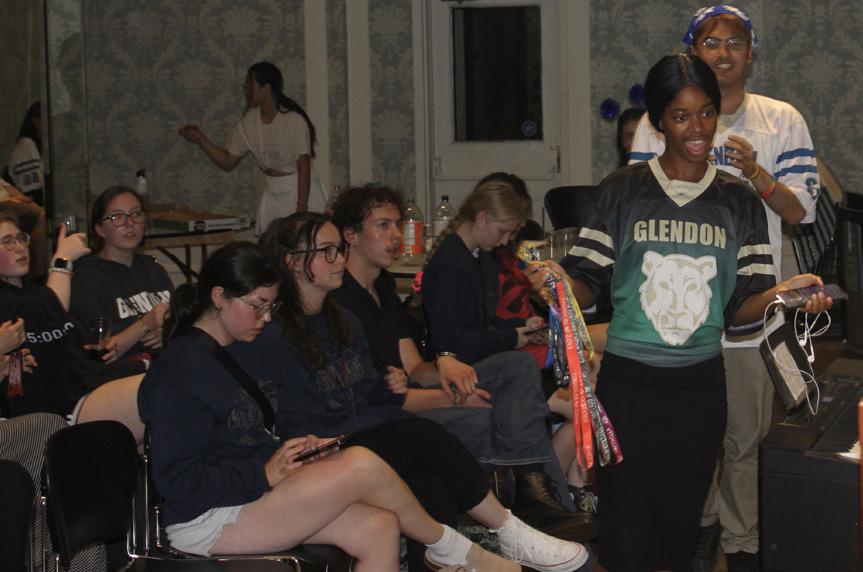
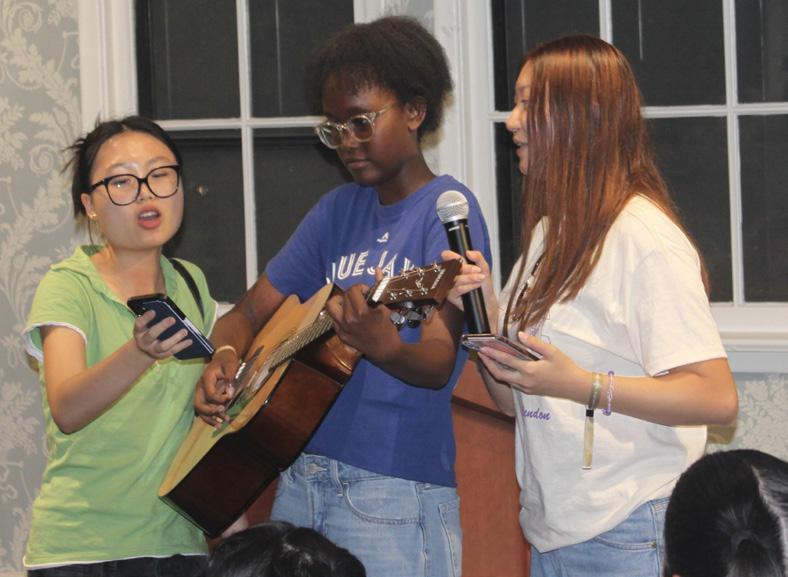
THANK YOU TO JUWON, FLO, AND CRYSTAL FOR THE WONDERFUL PICTURES!
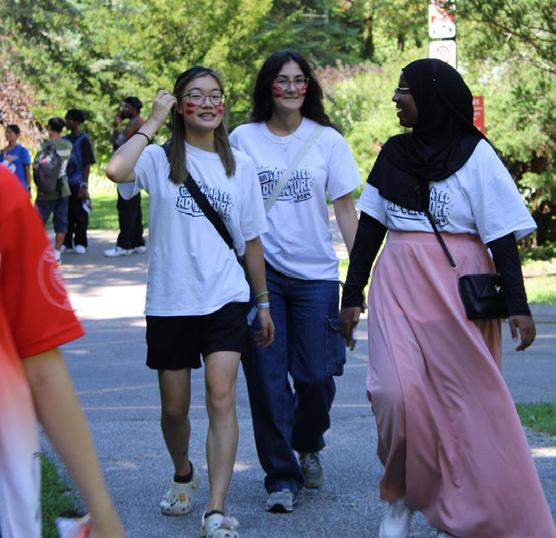
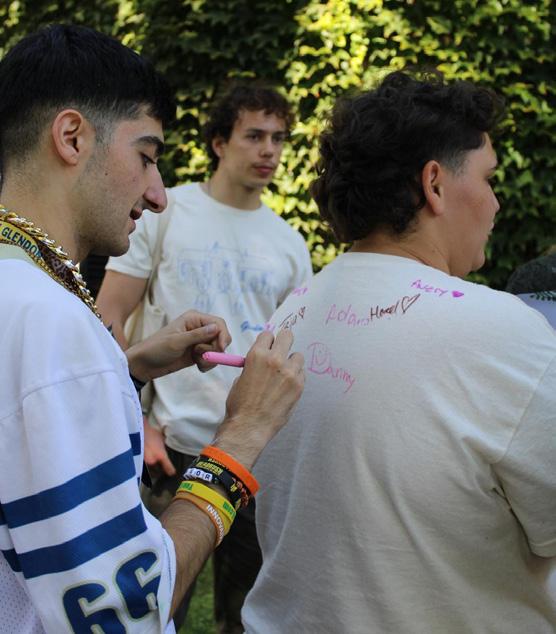

The 2024-25 NHL season is fast approaching. I will discuss the moves each team made during the offseason, any notable offseason news, as well as nominating each NHL team with a status of either Cup Contender, Playoff Team or Lottery Team. I will also provide a brief analysis explaining my thoughts on their significant offseason activities.
By Connell Simkin-Watt English Journalist
Calgary Flames
Notable Offseason Moves/News:
Drafted Zayne Parekh with the 9th overall pick in the 2024 NHL Draft1
Drafted Matvei Gridin with the 28th overall pick in the 2024 NHL Draft
Signed Anthony Mantha to a 1-year/$3.5 million contract
Signed Yegor Sharangovich to a 5-year/$28.75 million contract
Signed Jake Bean to a 2-year/$3.5 million contract
Status: Lottery Team
The Calgary Flames are in an interesting spot. On the one hand, they lack any superstar players, with Nazem Kadri being their top player. While he is still a good player, he hasn’t produced for Calgary in the same way he did for the Colorado Avalanche in 2022 when they went on to win the Stanley Cup. Jonathan Huberdeau, who they acquired in the 2022 trade that sent Matthew Tkachuk to Florida, also appears to be a shell of his former self, making it hard to believe that he put up 115 points only two seasons ago. On the other hand, the Flames have some very exciting young players, such as Connor Zary, and the recently-drafted Zayne Parekh and Matvei Gridin. The Flames also have the second-most cap space in the NHL, with just under 20 million dollars available, and they’ve used some of this cap space to improve their roster; most notably, they re-signed Yegor Sharangovich, who led the team in goals last season . While the Flames have an exciting future, I don’t see them making the playoffs this year.
Edmonton Oilers
Notable Offseason Moves/News:
Drafted Sam O’Reilly with the 32nd overall pick in the 2024 NHL Draft2
Signed Viktor Arvidsson to a 2-year/$8 million contract
Signed Jeff Skinner to a 1-year/$3 million contract
Signed Mattias Janmark to a 3-year/$4.35 million contract
Signed Adam Henrique to a 2-year/$6 million contract
Traded Ryan McLeod and Tyler Tullio to the Buffalo Sabres in exchange for Matthew Savoie
Traded Cody Ceci and a 2025 3rd round pick to the San Jose Sharks in exchange for Ty Emberson
Status: Cup Contenders
Since making the Stanley Cup finals last season, the Oilers have largely stayed the course. Despite limited cap space heading into the offseason, they managed to sign veteran players such as Viktor Arvidsson and Jeff Skinner, as well as re-sign their own free agents, such as Mattias Janmark and Adam Henrique. They also drafted Sam O’Reilly, with the last pick of the first round of the NHL Draft. With their strong core intact, the Oilers are well-positionedl for another deep playoff run.
Montreal Canadiens
Notable Offseason Moves/News:
Drafted Ivan Demidov with the 5th overall pick in the 2024 NHL Draft3
Drafted Michael Hage with the 21st overall pick in the 2024 NHL Draft
Signed Juraj Slafkovsky to an 8-year/$60.8 million contract
Signed Arber Xhakej to a 2-year/$2.6 million contract
Signed Kaiden Guhle to a 6-year/$33.3 million contract
Traded Jordan Harris to the Columbus Blue Jackets for Patrik Laine and a 2026 2nd round pick
Status: Lottery Team
The Montreal Canadiens have had one of the busier offseasons in the NHL, headlined by drafting Ivan Demidov fifth overall in the NHL Draft, and Michael Hage 21st overall. They also made one of the biggest splashes of NHL free agency by trading for Patrik Laine. Additionally, they locked in key players such as Kaiden Guhle, Arber Xhakej, and 2022 first-overall pick Juraj Slafkovsky. While the acquisition of Laine will no doubt improve the Habs’ roster, his consistency has been an issue throughout his career. Still, at just 26 years old, a change of scenery could benefit him. Despite these moves, I expect the Canadiens will likely miss the playoffs this season.
Ottawa Senators
Notable Offseason Moves/News:
Drafted Carter Yakemchuk with the 7th overall pick in the 2024 NHL Draft4
Signed David Perron to a 2-year/$8 million contract
Signed Michael Amadio to a 3-year/$7.8 million contract
Signed Shane Pinto to a 2-year/$7.5 million contract
Signed Nick Cousins to a 1-year/$800,000 contract
Status: Lottery Team
The Ottawa Senators have built a solid core over the past few years, with players such as Brady Tkachuk, Tim Stützle, and Drake Batherson. They also had the 7th overall pick in the 2024 NHL Draft, with which they drafted Carter Yakemchuk. They also vastly upgraded their goalie situation by trading Linus Ullmark for former Boston Bruins goalie. However, given the stiff competition in the Atlantic division, where they finished 7th last season, I still don’t see the Sens making the playoffs this year.
Toronto Maple Leafs
Notable Offseason Moves/News:
Drafted Ben Danford with the 31st overall pick in the 2024 NHL Draft5
Signed Max Domi to a 4-year/$15 million contract
Signed Timothy Liljegren to a 2-year/$6 million contract
Signed Chris Tanev to a 6-year/$27 million contract
Signed Joseph Woll to a 3-year/$10.98 million contract
Signed Oliver Ekman-Larsson to a 4-year/$14 million contract
Signed Anthony Stolarz to a 2-year/$5 million contract
Named Auston Matthews as their next captain
Status: Playoff Team
In recent years, the Maple Leafs have struggled immensely in the playoffs, advancing past the first round just once since 2004. After another early playoff exit, the Leafs made several moves to improve their roster, including signing notable free agents Oliver Ekman-Larsson and Anthony Stolarz, both of whom recently won the Stanley Cup with Florida. They also re-signed some of their own players such as Max Domi, Timothy Liljegren and Joseph Woll. Most strikingly, they stripped John Tavares of his captaincy and named Auston Matthews as the team’s new captain. While the Leafs have potential to make the playoffs again next year, they have extremely limited cap space, especially considering they have four players making over 10 million dollars. Additionally, they have struggled with their goaltending over the last few seasons, and this will likely continue.
Vancouver Canucks
Notable Offseason Moves/News:
Signed Filip Hronek to an 8-year/$58 million contract6
Signed Dakota Joshua to a 4-year/$13 million contract
Signed Tyler Myers to a 3-year/$9 million contract
Traded Elias Lindholm and Nikita Zadorov to the Boston Bruins for Jake DeBrusk, Danton Heinen and Derek Forbert
Signed Kiefer Sherwood to a 2-year/$3 million contract
Signed Vincent Desharnais to a 2-year/$4 million contract
Starting goaltender Thatcher Demko has continued to deal with an injury suffered during the postseason
Status: Cup Contender
Following their first playoff appearance since 2020, the Canucks doubled down on their success last season by signing several notable players. Firstly, they signed Filip Hronek to an 8-year extension, and Dakota Joshua to a 4-year extension. They also traded Nikita Zadorov and Elias Lindholm to the Boston Bruins, in exchange for Jake DeBrusk, Danton Heinen and Derek Forbert, as well as signed free agents Kiefer Sherwood, Vincent Desharnais and Daniel Sprong. Not to mention, they have a great goalie, Thatcher Demko, although he is still recovering from an injury suffered during the postseason. The Canucks are going to be a tough team to beat in the playoffs and have a shot at winning their first Stanley Cup.
Winnipeg Jets
Notable Offseason Moves/News:
Signed Dylan DeMelo to a 4-year/$19.6 million contract
Signed Kaapo Kahkonen to a 1-year/$1 million contract
Signed Colin Miller to a 2-year/$3 million contract
Signed Logan Stanley to a 2-year/$2.5 million contract
Status: Playoff Team

The Winnipeg Jets have had a relatively uneventful offseason but they are still in position to make the playoffs, especially considering they have arguably the best goaltender in the NHL, Connor Hellebuyck, who won the Vezina trophy this past season. While they didn’t make any huge moves, re-signing Dylan DeMelo to a 4-year contract strengthens their roster. After making the playoffs last season, Winnipeg will likely be back next season, as they have an excellent goalie surrounded by a solid core of players such as Kyle Connor, Mark Scheifele, and Josh Morrissey.
Par Natalia Tovilla-Bátiz Rédactrice Française
Avec des élections fédérales prévues l’année prochaine, les Canadien, jeunes et moins jeunes, se retrouvent volontairement tenus dans l’ignorance. En 2023, le Canada a adopté une loi fédérale qui a provoqué des tensions entre le gouvernement, le public, les journalistes et les géants de la technologie tels que Meta. Le projet de loi C-18, connu sous le nom de Loi sur les nouvelles en ligne, était une tentative du gouvernement Trudeau pour forcer les géants de la technologie à dédommager les journalistes et les organismes de presse canadiens pour le partage de leur contenu. En réponse, les géants de la technologie ont décidé qu’il valait mieux supprimer complètement les contenus d’information de leurs plateformes plutôt que de se conformer à la nouvelle législation. Cette décision inquiète et met en péril la santé future de notre démocratie et de l’engagement civique politique.
Les ramifications de cette interdiction sont troublantes. La capacité des citoyens canadiens à rester informés facilement est grandement affectée, alors que la plupart passent de longues heures en ligne chaque jour.
Sommes-nous vraiment prêts à ignorer les dangers liés au fait de ne pas être informés de manière habituelle ?
Sommes-nous en train de nous soumettre aux dangers des chambres d’écho algorithmiques, à la diffusion virulente d’informations non vérifiées, ce qui accroît l’apathie des jeunes à l’égard de la politique et leur désengagement ? Cet article examine ces effets en détail, en soulignant comment ces interdictions sapent l’engagement démocratique et menacent une citoyenneté informée dans notre démocratie, autrefois saine.
L’un des dangers les plus immédiats de l’interdiction des contenus d’actualité sur les réseaux sociaux au Canada est l’érosion de l’accès aux informations factuelles. L’autre danger est la lenteur avec laquelle le gouvernement Trudeau tente de rétablir cet accès. Étant donné qu’un nombre écrasant d’électeurs Canadiens admissibles utilisent des plateformes comme Facebook et Instagram pour s’informer quotidiennement, cette interdiction crée un vide informationnel, où l’absence de nouvelles vérifiées par des journalistes professionnels est notable. Selon les enquêtes, une
pourcentage important de Canadiens utilisent les médias sociaux comme principale ou secondaire source d’information au quotidien. Pour de nombreux jeunes électrices et électeurs éligibles, cette interruption représente une coupure majeure de leur principal moyen de rester informés, laissant un vide difficile à combler par d’autres sources.
Les médias locaux, souvent sous-financés et dépendant des réseaux sociaux pour atteindre un public plus large, ont été disproportionnellement touchés. L’interdiction a entraîné des préoccupations selon lesquelles les gens ne chercheront pas d’alternatives pour accéder à l’actualité, choisissant plutôt de se désengager ou de se tourner vers des sources non conformes aux normes journalistiques. Avec les sources d’informations crédibles désormais moins accessibles sur les principales plateformes de réseaux sociaux, la désinformation et la mésinformation risquent de combler ce vide. Les réseaux sociaux ont depuis longtemps eu du mal à freiner la propagation de fausses informations, et le retrait du journalisme professionnel de ces espaces n’a fait qu’aggraver le problème. Sans ces sources de nouvelles vérifiées, les utilisateurs sont confrontés à un environnement numérique où des contenus douteux, souvent sensationnalistes, peuvent proliférer sans contrôle. Les récits fallacieux, les théories du complot et les titres trompeurs ont tendance à se propager plus rapidement et plus largement sur les réseaux sociaux que les nouvelles factuelles. Ces histoires non vérifiées jouent sur les émotions, attisent la colère et sont conçues pour être partagées. L’absence de médias crédibles dans l’espace numérique signifie qu’il y a moins de voix autoritaires pour contrer la vague de contenus trompeurs. Par conséquent, la frontière entre les faits et la fiction devient de plus en plus floue pour de nombreux Canadiens, et la compréhension publique des enjeux cruciaux est déformée. Cette amplification de la désinformation peut avoir des conséquences graves pour les processus démocratiques. Un public bien informé est essentiel à une démocratie fonctionnelle. Si les citoyens prennent des décisions sur la base d’informations déformées ou erronées, l’intégrité des institutions démocratiques peut être compromise. De plus, lorsqu’ils

tombent dans les pièges de la désinformation, leur confiance envers le journalisme, les institutions gouvernementales et même la recherche scientifique peut s’effriter, entraînant une polarisation et une méfiance accrues au sein de la société.
L’un des effets à long terme les plus préoccupants de l’interdiction des nouvelles sur les réseaux sociaux est son impact sur les jeunes générations. Pour beaucoup d’entre eux, les réseaux sociaux ne sont pas seulement une plateforme de divertissement, mais aussi une source primaire d’informations. En interdisant les contenus d’actualité de plateformes comme Instagram et Facebook, il y a un réel risque de désengagement encore plus marqué de la part des jeunes vis-à-vis de la politique et de la vie civique. Le désengagement politique des jeunes est déjà un problème pressant dans de nombreuses démocraties, y compris au Canada. Des études montrent que les jeunes votent moins, participent moins aux discussions politiques et consomment moins les sources d’informations traditionnelles que les générations plus âgées. Les réseaux sociaux, avec leur capacité à délivrer des nouvelles sous forme de courtes vidéos, de mèmes et d’infographies, avaient été un outil précieux pour impliquer les jeunes citoyens dans la politique. La suppression des contenus d’actualité sur ces plateformes aggrave le problème, coupant une voie cruciale pour l’engagement politique. Bien que les plateformes comme TikTok et Instagram puissent servir de points d’entrée à la prise de conscience politique, elles privilégient souvent des contenus plus divertissants qu’informatifs. Sans sources crédibles pour contrebalancer, les jeunes pourraient former des compréhensions superficielles des enjeux politiques ou, pire, se désengager complètement, considérant la politique comme insignifiante dans leurs vies. Ce désengagement menace l’avenir de la démocratie au Canada. Une jeunesse apathique affaiblit la diversité de l’électorat et sape la vitalité des institutions démocratiques. Si les jeunes ne sont pas informés des
enjeux qui les concernent, tels que le changement climatique, l’éducation et l’emploi, ils seront moins susceptibles de plaider pour des politiques qui reflètent leurs intérêts et leurs valeurs. Ainsi, un cycle de désengagement politique est formé, où les préoccupations des jeunes générations sont marginalisées dans le discours public. En fin de compte, l’interdiction des nouvelles sur les réseaux sociaux menace l’essence même de la participation démocratique au Canada. L’accès à l’information est un pilier fondamental de la démocratie. La décision des plateformes de réseaux sociaux de supprimer les contenus d’actualité au Canada a eu des conséquences de grande portée, bien au-delà de la simple perte d’accès à l’information. La propagation de la désinformation, l’approfondissement de l’apathie politique des jeunes, et l’érosion de la participation démocratique posent tous les défis sérieux pour la société canadienne à l’ère numérique. Alors que le monde devient de plus en plus dépendant des plateformes numériques pour la consommation des nouvelles, il est crucial de maintenir l’accès à un journalisme crédible et équilibré. Les décideurs politiques, les organisations médiatiques et les entreprises technologiques doivent collaborer pour trouver des solutions qui protègent le droit du public à l’information tout en veillant à ce que l’écosystème numérique reste un espace d’engagement démocratique éclairé. Sans de tels efforts, l’avenir de la démocratie canadienne pourrait être en danger. Si nous regardons nos voisins américains du sud, ces conséquences discutées sont des conséquences qui se cachent et qui attendent d’avoir un impact ; il ne s’agit plus de « si » mais de « quand ». Et nous devons nous demander : sommes-nous, en tant que futurs électeurs, prêts à faire face à ces défis ? Notre démocratie est-elle assez forte pour faire face aux conséquences qui nous attendent si nous ne répondons pas à ces menaces avant le début des prochaines élections fédérales ? Ne marchez pas, courez vers vos courriels et contactez vos députés pour exiger que des mesures soient prises !
By Geneviéve Stacey Bilingual Journalist
Ma dactylo mécanique Royal 200 des années 60 est probablement une des machines les plus merdiques de l’âge d’or d’où elle est issue. Ce n’est pas une IBM futuriste ou une Olivetti moderniste. C’est un outil des plus abordables, doté seulement de ce qui est nécessaire pour l’usager, comme ma grand-mère, qui m’en a gracieusement fait le don. Un bloc compact de métal beige défraîchi, son unique atout est son clavier francphone. La touche « A » se coince sans faute. La qualité d’impression est grossière. J’adore cet engin.

Malgré ma réputation d’amatrice de technologie désuette, j’avais un raisonnement pragmatique pour hériter de cette antiquité. La pandémie et la prolifération du travail en ligne ont dévoilé un défaut assez important dans mes habitudes de travail : je peine à travailler à
l’ordinateur sans sombrer dans le gouffre ouvert qui est l’Internet. Une heure désignée pour la rédaction d’essai a de fortes chances d’être dédiée à une recherche approfondie sur un sujet très important comme la musique mariachi en Yougoslavie, le Google Docs étant quasiment vierge. Mon inclusion du manque de fonctions chez ma machine dans sa liste de défauts est assez trompeuse, car c’est ma raison principale de rédiger cet article même à la dactylo. Aucune barre de recherche, aucun bris dans la rédaction. Cet article ne fut aucunement affecté par mon TDAH. Les rares fois que j’ai amené ma Royal en classe ont suscité une réaction guère positive. J’avais trouvé une nouvelle façon de manifester mon excentrisme et j’admets que la symphoniepercussive générée par ma frappe n’est guère accommodante à ceux qui préfèrent le silence. Donc, j’ai pris la décision exécutive d’utiliser mon as académique seulement en privé. Cette restriction n’est aucunement restrictive ; en soirée, accompagnée de musique appropriée, il me faut des heures pour compléter une semaine de travail à l’ordinateur. Je deviens aussi mécanique que ma machine, et 2 heures plus tard, voilà une chronique complétée en Courier taille 12. Le martèlement est une hypnose créative.
A few months ago, I did the unthinkable. I gifted my Royal a sibling, acquired for just ten dollars at a yard sale. My Smith Corona XL
By Destiny Chan French Editor
Have you ever wondered what it would be like if you picked up your entire life and ran away to someplace else? Perhaps a whole other country? A whole other continent? If you could escape all your troubles, mundane routines, and societal expectations? No more “What would my parents say? What would my friends think? How would my classmates and coworkers react?”. Simply packing your suitcases and shipping off elsewhere to live, to breathe, to explore, to exist?
1800 electric typewriter is probably one of the most crappiest machines of the twilight age in which she was made. Released at an age when the PC, Macintosh, and Amiga were sweeping the typewriter’s old turf, this cheap 80s beast is also a tired yellowed slab; its only feature is a whiteout button that does not work. It is barely portable, requires electricity whereas the Royal does not, and has one of the worst feeling keyboards I’ve ever had the pleasure of typing upon. Despite all this, I love this thing. Its print quality is perfect and the electric action makes it, in many ways, more convenient than the Royal. It’s so imposing in a late 80s way; writing with it makes me want to listen to Whitney Houston while wearing the boxiest power suit. I was deeply saddened that I could not make room for it in my dorm room for it feels like a natural companion to its manual sister. Both obsolete sepia crimes against industrial design that, nonetheless, made me love writing again. I feel genuine affection just from being able to take them apart, clean every nook, and see how they work in the process. They will never have a buggy update, they will never lock me out with a subscription service, and I don’t need to do political campaigning to have the right to repair them. My typewriters are mine, and despite its infinite possibilities, my MacBook will never incite the same feelings. It is ascetic to my user experience where its elders are not.
Une fois ce paragraphe achevé, je vais scanner ces pages dans Google pour corriger mes
ting on a plane just three months later. Fun fact: I have only been on plane trips three times and have never been to Europe. An impulsive decision and several interviews later, here I am.
So, what is an au pair, you ask? According to Aupairworld.com, the website I used to find my host family, “An au pair is a young person between the ages of 18 and 30, single and without children, who travels to a foreign country for a defined period to live with a host family. As an au pair, you take on a role as a member of the family and help your host family with childcare and light housework. In return, you receive free room and board plus pocket money.”1 Host countries include the USA, Australia, Austria, Belgium, Canada, Denmark, Finland, France, Germany, Iceland, Ireland, Italy, Japan, Liechtenstein, Luxembourg, the Netherlands, New Zealand, Norway, Spain, Sweden, Switzerland, and the United Kingdom. I first learned what an au pair was after reading “The Elephants in My Backyard: A Memoir” by Rajiv Surendra in high school. Rajiv is a Toronto native who grew up next to the Toronto Zoo, went to UofT for art history, and played the Indian mathlete in “Mean Girls”.

(nombreuses) erreurs de frappe, ainsi que toute autre édition textuelle nécessaire. Mon amour de l’analogique ne mérite pas une haine du numérique. Il y a énormément à admirer chez les deux, et je suis certaine que le nombre important des lecteurs de cet article ont eu des expériences similaires avec les disques vinyles et la photo pellicule. La dactylo n’a pas mérité la même appréciation des internet, ce que je trouve étrange vu la popularité de cette esthétique bouquineuse tiré du Wes Anderson et autres. J’espère que cet article, peu importe sa circulation, sert de thèse à ceux qui voudraient ou auraient même besoin d’une machine à écrire. L’amour du look est une raison parfaitement valable de vouloir acquérir une antiquité mais une raison pragmatique contemporaine de faire ainsi est assez rare et mérite considération. Ma Royal 200 est utilisée 60 ans après sa fabrication, et je souhaite que tous nos produits ménagers méritent une telle appréciation et puissent le fournir sur plusieurs générations. C’est écolo, c’est pragmatique, mais surtout c’est romantique.

He later became an au pair in Germany to two boys after devastatingly not getting the lead role in “Life of Pi,” for which he had prepared arduously. All of a sudden, he had instantly received the life changing opportunity to escape and explore.
This desire sparked in me quite fiercely, very recently—a desire for a fresh start, an escape, new people, new vibes, and new experiences. My name is Destiny Chan, a Glendon student studying English and French, and I am currently taking a gap year to be an au pair in Europe. And where am I going exactly? The South of France. Montpellier. Beaches, a slow pace of life, and warmer weather. It was quickly decided upon. If you had asked me even in May 2024, I would not have known I would be get1AuPairWorld. Accessed September 2, 2024. https://www.aupairworld.com/en/become-an-au-pair.
How do you become an au pair? All you have to do is create a profile, find a host family, get in contact, agree on a contract, and get ready to go. In the same way that you create a profile with pictures, a quick introductory bio, and a list of things you are looking for (countryside vs. city, pets vs. no pets, countries, etc.), families make profiles of what they are looking for, what their kids are like, what their city is like, what your weekly responsibilities and accommodations will be, and more.

Some families look for a three-month au pair or less. Many families look for an au pair for the school year to assist with picking up the kids from school. In France, au pairs are guaranteed a private bed and bath, as well as a maximum of 25 hours of work per week, providing plenty of time to travel and relax. Many European families are also looking for native English speakers to help their kids learn English.
In May, while hating my life and painfully trying to finish my essays after deferring them during strike season, I googled, on a whim, “How to become an au pair?”. I randomly made a profile thinking it would be good to know the process for years down the line when I do decide to do it. Unexpectedly, I found out May happens to be when many families search for an au pair for the school year starting in September, as the visa process takes a few months. As I looked through families’ profiles, I started thinking, “Could I do this?”. As I started receiving messages from families in Spain, Italy, the UK, and France, the voice grew louder: “Could I do this?”. As I started interviews with families, (which were chill WhatsApp video calls where ironically, families were pitching to me why I should choose them rather than the other way around), I thought, “Could I do this?”. When my current host family asked me to be their au pair and sent me the contract, I still thought, “Am I doing this?”. After signing the contract, getting my visa, and buying a plane ticket all in the span of 1-2 months, I was still thinking, “Am I really doing this?”. After saying goodbye to all my friends and my dad, packing my life into three bags (which is seriously stressful, and thank God there won’t be any snow because none of my sweaters or sweatpants made the cut), arriving at the house, and meeting the kids, it sank in: “I am really doing this”.
Isn’t it a bit irresponsible to leave school and put your career on hold? Well, Grade 12 Destiny thought I would have graduated from business school and be making a six-figure salary in finance by now, so I think it’s safe to say that I did not stick to Plan A, so why stick to Plan B, C, or D? My dream goal in life is to become a teacher, in hopes of being able to give back what my teachers gave to me growing up. Thus, I am still working with kids and working towards my goals. Furthermore, after being in Core French all my life, it would be nice to have a more organic and expedited way to improve my French. What better way than with a host family who is happy to help me improve daily? Sidenote—if you would like to take a gap year, Academic Services advised me that you do not need to fill out any form to declare anything at all, but simply reactivate your account within a maximum of 18 months after receiving the last grade on your transcript. Thankfully, it is this flexible at York University, as I’m sure some other universities would not be the same. The current
plan is to come back in September 2025, finish my French minor by completing my last year, and then, with a heavy heart, say farewell to my undergraduate degree journey.
At the end of the day, your 20s won’t last forever. You might as well put yourself in uncomfortable situations if it means you’ll grow and learn from it while good health insurance isn’t too important yet. Au pairing for me is a chance to live at a new place for free with food, pocket money, and instant family included to help with all your needs as well as assist two working parents raise good humans. Many of us at Glendon have similar goals of being in education and/or travelling on a budget. I know many university students go on exchange and/or have a thirst for travel, so I hope reading this has given you ideas of other ways to go about those goals, especially for those without the financial means to go on exchange.
When I first started writing this piece, I was sitting in College Park, Downtown Toronto, watching skater boys, smelling weed, and hearing the sounds of water tumbling down the umbrella fountains. Now sending it for editing, I’m sitting in the kitchen of my au pair apartment, at 4 a.m. France time, after dinner of sushi takeout my host mom ordered to help me feel more at home. Life seems to be a little strange like that. I plan to write more for hopefully every issue while I’m here, each column with a different topic—a new word I learned, a culture shock, a new experience, a new product, etc. Stay tuned and join in the ride as I find out just what the heck I signed up for, where I go, and what I learn on the way. Wish me luck and bon voyage!
P.S. Hope you enjoy this poem about my arrival.
Walking Up The Ramp
Ding dong ding
“Nous sommes arrivés à Montpellier, Sud de France”
Unexpected tears
At the airport
Turn back in the security line
Wave back again and again
The image of my dad looking smaller and smaller
But my therapist told me to let myself cry
Let myself let it out
Let myself feel
As I’m waiting at the gate
A message comes
“Be safe. I love you <3”
Cry all over again
The plane is a blue luminescent organ and we are the cells
Sitting prison, my ankles swell
One baby wails like they’ll never see the sun again whilst being tortured
The whole flight
In and out of consciousness
Screens all around me depict the hottest movies and shows
Headache, nausea, they serve us beef lasagna
Arriving at CDG
Paris!
Except we can’t see the Eiffel Tower from the plane
window like in “Monte Carlo”
And the airport is too far away from the city center to see it from the outside
Shuttle
Tired
Tourte de saumon et brocoli
Apricot anglaise
Pain au chocolat
Wait
Fall asleep in the airport café
Platform
Get yelled at by the conductor
On the train
Looking out the window
Blue sky and country farms
I think of
Him
And how it doesn’t matter where you are but who you’re with
And at that moment, I wished I could be with him and he could be here with me
And that I had never come to France in the first place
Exhausted
Beaten
Keeping an eye on my bags for fear of them being stolen
But everyone is nice and old
Senior people who look at my youth and foreign
Asian appearance and smile
Arrival
Take my bags
Get off
Bright afternoon
Sun seems like its been out for 18 hours
The platform is a grey metal plane
With, I kid you not,
This big ass ramp, the size of three train cars, leading you up to the station
I roll my suitcases up for what felt like forever and no time at all
Heat
Ascension
I was the last one off
Self-conscious
Then
I catch a glimpse of Alban and Louis waiting at the top
They smile and wave
I take breaks from lugging the luggage to wave back
I’m nervous
Will they like me?
Will they be kind?
What are they like?
It’s exciting
It’s terrifying
It’s change
It’s life
“Hi”
“Bonjour, bienvenue!”
“So nice to meet you, I’m Destiny”
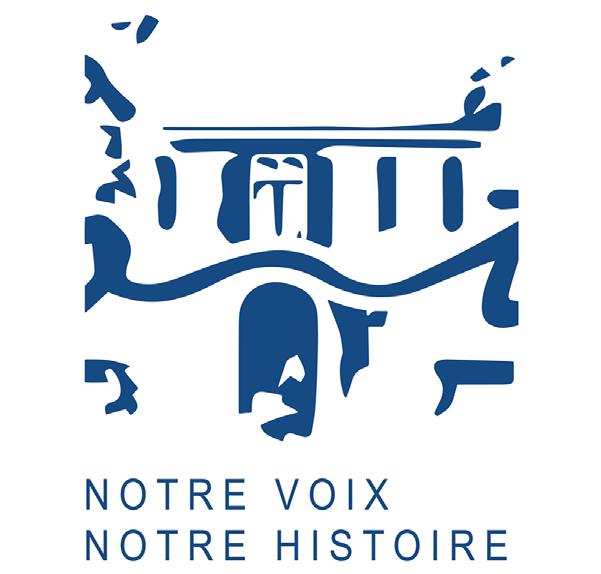
la semaine d’orientation, une première épreuve pour la timidité et l’anglais…
Par Iris Capron Journaliste Française
Étudiante tout droit venue du pays de la baguette et du croissant, je vous offre ces quelques lignes pour vous raconter mon expérience lors de la fameuse semaine d’orientation à Glendon. En tant que personne plutôt réservée avec un niveau d’anglais basique, cette semaine m’attirait autant qu’elle m’effrayait. Néanmoins, c’était sans compter l’équipe Navy et les activités fortes en émotions qui m’attendaient… 27 août 2024, le premier jour de la semaine d’orientation, le stress était à son comble dans cet environnement plus qu’étranger. Entourée de groupes qui semblaient à l’aise face à l’inconnu, la timidité prenait le dessus, et le sentiment de ne pas être à sa place avait redoublé. Que fais-je ici, sur ce campus canadien loin de chez moi, parmi tous ces étudiants que je ne connais pas ? La réponse à cette question était rapidement trouvée lorsque je m’étais retrouvée avec l’équipe Navy : des personnes respirant la joie de vivre, des enfants de 20 ans qui ont envie de crier « Navyyyyyy » jusqu’à ne plus avoir d’air dans leurs poumons. Sans pour autant devenir très bavarde, je me sentais peu à peu à ma place, et prête à profiter de la semaine qui m’attendait. Entre la découverte de Toronto, les fêtes sur le
campus Keele, la soirée Open-Mic ou encore le carnaval, je suis passée par toutes les émotions : l’émerveillement devant le CN tower, la nostalgie en étant bercée par la reprise d’une chanson de Michel Sardou, l’admiration quant au travail des leaders, l’étonnement face à mon petit talent pour le tir à l’arc et, évidemment, la joie face à la victoire de mon équipe, NAVY.
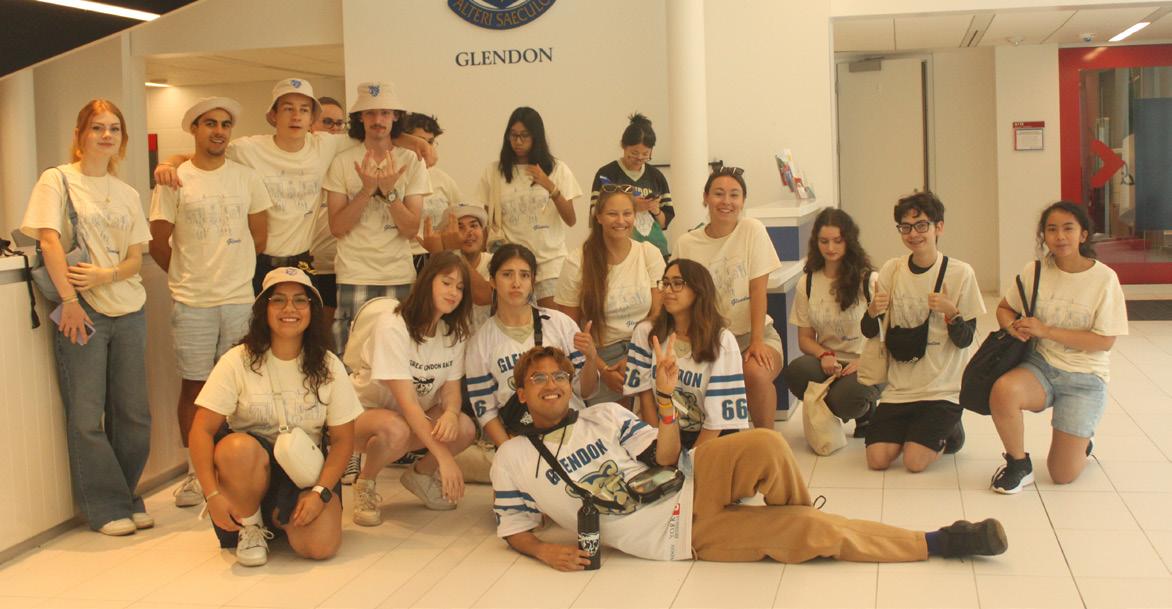
La timidité était toujours là, mais je me sentais bien et plus à l’aise que le premier jour. Cependant, un autre point qui m’inquiétait dès le début me poursuit plus longtemps que la timidité : la barrière de la langue. Être timide est quelque chose de compliqué à vivre au quotidien, mais devoir chercher ses mots constamment l’est davantage. Néanmoins, ne pas savoir parler l’anglais ne veut pas dire qu’il est impossible de communiquer : n’oublions pas que l’échange ne se fait pas seulement par la parole, mais également par les gestes et les regards. Un sourire est toujours un premier pas vers l’autre. Malheureusement pour tous les anxieux tels que moi, si l’on veut devenir bilingue, il faut parler. S’exprimer dans une langue étrangère auprès de personnes inconnues peut s’avérer être une tâche ardue, mais
ce défi pourrait bien être surmontable. Si je l’ai fait, je pense que beaucoup peuvent le faire. On est toujours plus courageux que ce que l’on pense : parfois, il faut se faire confiance et faire confiance aux autres. Ces mots peuvent sembler des banalités, mais de ma petite expérience, ils sont véridiques. En tant que personne timide et discrète, je ne peux pas changer de personnalité et devenir bavarde avec des inconnus. Néanmoins, faire un premier pas vers l’autre a sûrement changé le cours de ma semaine d’orientation et de mon année scolaire à l’université York.
Si je pouvais résumer cette semaine en un mot, je dirais sûrement « découverte ». Pour moi, cela a été évidemment la découverte de Toronto, celle du campus Glendon, de la culture canadienne, mais également la découverte de nouvelles personnes et d’une nouvelle version de moi-même, une version canadienne peut-être…
GLENDON - KEELE
SHUTTLE SCHEDULE / HORAIRE DU NAVETTE
York Hall/Pavillion York
7:10 a.m. ........................................... 7h10
8.00 a.m. ........................................... 8h00
9:30 a.m. ........................................... 9h30
10:30 a.m. ....................................... 10h30
11:30 a.m. ....................................... 11h30
1:00 a.m. ......................................... 13h00
2:30 a.m. ......................................... 14h30
3:30 a.m. ......................................... 15h30
4:30 a.m. ......................................... 16h30
5:30 a.m. ......................................... 17h30
7:00 a.m. ......................................... 19h00
9:30 a.m. ......................................... 21h30
10:45 a.m. ....................................... 22h45
RESERVE YOUR SEAT USING WITH/ RESERVER VOTRE SIÈGE AVEC : “TRANSACT MOBILE ORDERING APP”
WANT TO PLACE AN AD?
VOULEZ-VOUS PLACER UNE ANNONCE?
SEND AN EMAIL TO photography@protemglendon.com
ISSUE EVERY OTHER THURSDAY NEXT ONE IS OCTOBER 3RD
LIBRARY HOURS HORAIRE DE LA BIBLIOTHÈQUE
MONDAY/LUNDAY ............................ 8AM-7PM TUESDAY/MARDI ............................... 8AM-7PM WEDNESDAY/MERCREDI ................. 8AM-7PM THURSDAY/JEUDI ............................ 8AM-7PM FRIDAY/VENDREDI ........................... 8AM-6PM SATURDAY/SAMEDI .......................... 1PM-6PM SUNDAY/DIMANCHE ...................... 12PM-8PM

SUNDAY,SEPTEMBER 22 2024